- Skip to main content
- Skip to "About this site"

Language selection
Search travel.gc.ca.
Help us to improve our website. Take our survey !
COVID-19: travel health notice for all travellers
Azerbaijan travel advice
Latest updates: Editorial change
Last updated: August 7, 2024 15:28 ET
On this page
Safety and security, entry and exit requirements, laws and culture, natural disasters and climate, azerbaijan - exercise a high degree of caution.
Exercise a high degree of caution in Azerbaijan due to regular tensions in areas along the border between Azerbaijan and Armenia.
Districts in the western part of Azerbaijan - Avoid all travel
The Government of Canada’s ability to provide consular services in these regions is extremely limited.
Border with Armenia - Avoid all travel
This advisory excludes the area within 1 km of the border between Armenia and the Azerbaijani Autonomous Republic of Nakhchivan where you should avoid non-essential travel due to the risk of armed clashes.
Back to top
Districts in the western part of Azerbaijan
Unexploded ordnance continue to pose a risk in areas of western Azerbaijan, including the Nagorno-Karabakh region, especially in the following districts:
You must have special travel permission from Azerbaijani authorities to enter these areas.
The Government of Canada’s ability to provide consular services in these regions is extremely limited.
If you decide to travel to the Nagorno-Karabakh region and/or to districts in the Western part of Azerbaijan despite the advisory in effect:
- be extremely vigilant in remote areas
- stay on paved and main roads
- don’t walk in fields
- avoid roadside ditches, shoulders and unmarked trails
- pay attention to signs indicating the possible presence of unexploded ordnance
- report any suspicious items to local authorities
Border areas with Armenia
The Government of Canada’s ability to provide consular services in areas along the Armenia-Azerbaijan international borders is extremely limited.
The security environment remains highly volatile at the border between Azerbaijan and Armenia since the November 2020 ceasefire agreement ending the Second Karabakh War with Azerbaijan. The ceasefire observed by Russian peacekeepers remains in effect, but there have been numerous violations and tensions could resume at any time.
In 2023, Azerbaijan established a border checkpoint at a bridge at the entrance of the Lachin corridor at the border with Armenia. All other border crossings into Armenia are closed.
Border areas with Armenia are subject to extremely dangerous military activities, such as:
- mortar and artillery shelling
- rocket fire
- drone attacks
- heavy gunfire
If you choose to travel near the border with Armenia despite this advisory:
- exercise caution at all times
- avoid travelling at night
- monitor local and international media to stay informed on clashes
- follow instructions from local authorities and security forces
Crime is relatively low. Most reported crimes involve burglary, assault or petty crime, such as pickpocketing.
Thieves sometimes pose as police officers and demand that tourists pay on-the-spot fines. If faced with this situation, offer to follow the officer to the nearest police station to pay the fine.
- Avoid walking alone after dark
- Be careful in areas that attract large crowds and areas that are very isolated or dimly lit
- Don’t carry large amounts of cash
- Don’t display signs of affluence
- Ensure that your belongings, including your passport and other travel documents, are secure at all times
Credit card and ATM fraud occurs. Be cautious when using debit or credit cards:
- pay careful attention when your cards are being handled by others
- use ATMs located in well-lit public areas or inside a bank or business
- avoid using card readers with an irregular or unusual feature
- cover the keypad with one hand when entering your PIN
- check for any unauthorized transactions on your account statements
If you’re travelling to Azerbaijan to meet someone you’ve only met online, you may be the victim of a scam.
More about overseas fraud
Spiked food and drinks
There have been incidents of drink spiking, resulting in victims being robbed.
Never leave food or drinks unattended or in the care of strangers. Be wary of accepting snacks, beverages, gum or cigarettes from new acquaintances. These items may contain drugs that could put you at risk of sexual assault and robbery.
Demonstrations
Demonstrations take place from time to time.
Even peaceful demonstrations can turn violent at any time. Police may use force to suppress demonstrations.
They can also lead to disruptions to traffic and public transportation.
- Avoid areas where demonstrations and large gatherings are taking place
- Follow the instructions of local authorities
- Monitor local media for information on ongoing demonstrations
More about mass gatherings (large-scale events)
There is a threat of terrorism. Terrorist attacks could occur at any time.
Targets could include:
- government buildings, including schools
- places of worship
- airports and other transportation hubs and networks
- public areas such as tourist attractions, restaurants, bars, coffee shops, shopping centres, markets, hotels and other sites frequented by foreigners
Always be aware of your surroundings in public places.
Stay at hotels that have robust security measures. Keep in mind, however, that even the most secure locations can’t be considered completely free of risk.
Road Safety
Highways and major city roads are well-maintained, but driving can still be dangerous due to poor driving standards and poorly maintained cars. Many drivers do not pay attention to speed limit, traffic rules and traffic signs. Insufficient street lighting and signage make travel dangerous outside of Baku. The risk increases on certain roads that are shared with pedestrians and livestock.
Authorities don’t enforce traffic rules consistently.
Pedestrians should exercise caution.
Public transportation
Buses are poorly maintained, often overcrowded and unsafe, particularly outside of Baku. Baku Metro is reasonably maintained and has basic safety equipment. Expect to see security cameras throughout the platforms and a police presence at each metro station, particularly at night.
Only use officially marked taxis, which are metered, have seatbelts and are cheaper than unmarked taxis. Avoid shared taxis and unofficial taxis because passengers have been assaulted.
If you must travel by train, store personal belongings in a safe place and don’t leave your compartment unattended. Ensure the door is secured from the inside.
We do not make assessments on the compliance of foreign domestic airlines with international safety standards.
Information about foreign domestic airlines
General safety information
Tourist facilities are limited outside of the Absheron Peninsula, Baku, Lankoran and Quba.
Every country or territory decides who can enter or exit through its borders. The Government of Canada cannot intervene on your behalf if you do not meet your destination’s entry or exit requirements.
We have obtained the information on this page from the Azerbaijani authorities. It can, however, change at any time.
Verify this information with the Foreign Representatives in Canada .
Entry requirements vary depending on the type of passport you use for travel.
Before you travel, check with your transportation company about passport requirements. Its rules on passport validity may be more stringent than the country’s entry rules.
Regular Canadian passport
Your passport must be valid for at least 3 months beyond the date you expect to leave from Azerbaijan.
Passport for official travel
Different entry rules may apply.
Official travel
Passport with “X” gender identifier
While the Government of Canada issues passports with an “X” gender identifier, it cannot guarantee your entry or transit through other countries. You might face entry restrictions in countries that do not recognize the “X” gender identifier. Before you leave, check with the closest foreign representative for your destination.
Other travel documents
Different entry rules may apply when travelling with a temporary passport or an emergency travel document. Before you leave, check with the closest foreign representative for your destination.
Useful links
- Foreign Representatives in Canada
- Canadian passports
Canadians must be in possession of a visa to visit Azerbaijan.
Tourist visa: Required
Business visa: Required
Student visa: Required
Transit visa: Required
If you plan to visit Azerbaijan, you must have a visa before arriving in the country. As a tourist, you can apply for an e-visa through Azerbaijan’s online visa portal. You should do so at least 3 days before your planned arrival date.
E-visas are single entry and are valid for 30 days. If you require any other type of visa, you must apply for it from the Embassy of the Republic of Azerbaijan prior to departure.
To obtain any type of visa, you must present a letter of invitation from a contact in Azerbaijan, such as an employer or educational institution. If you don’t have a contact in Azerbaijan, the invitation letter should be submitted by the travel agency in Azerbaijan.
Azerbaijan’s online visa portal
Registration
You must register with the State Migration Service within 15 calendar days of arrival if you intend to stay more than 15 days. Ensure that your passport is stamped with a residency stamp.
Failure to register could result in a fine. You may be stopped from leaving Azerbaijan until the fine is paid.
If you intend to stay in Azerbaijan for more than 30 days, you must obtain a temporary residence card or apply to extend your visa.
State Migration Service
Nagorno-Karabakh
You may need to obtain prior authorization from the Azerbaijan authorities to enter and/or exit the Nagorno-Karabakh region. You should contact the nearest embassy or consulate of Azerbaijan before you travel.
Yellow fever
Learn about potential entry requirements related to yellow fever (vaccines section).
- Children and travel
Learn more about travelling with children .
Relevant Travel Health Notices
- Global Measles Notice - 13 March, 2024
- COVID-19 and International Travel - 13 March, 2024
This section contains information on possible health risks and restrictions regularly found or ongoing in the destination. Follow this advice to lower your risk of becoming ill while travelling. Not all risks are listed below.
Consult a health care professional or visit a travel health clinic preferably 6 weeks before you travel to get personalized health advice and recommendations.
Routine vaccines
Be sure that your routine vaccinations , as per your province or territory , are up-to-date before travelling, regardless of your destination.
Some of these vaccinations include measles-mumps-rubella (MMR), diphtheria, tetanus, pertussis, polio, varicella (chickenpox), influenza and others.
Pre-travel vaccines and medications
You may be at risk for preventable diseases while travelling in this destination. Talk to a travel health professional about which medications or vaccines may be right for you, based on your destination and itinerary.
Yellow fever is a disease caused by a flavivirus from the bite of an infected mosquito.
Travellers get vaccinated either because it is required to enter a country or because it is recommended for their protection.
- There is no risk of yellow fever in this country.
Country Entry Requirement*
- Proof of vaccination is not required to enter this country.
Recommendation
- Vaccination is not recommended.
* It is important to note that country entry requirements may not reflect your risk of yellow fever at your destination. It is recommended that you contact the nearest diplomatic or consular office of the destination(s) you will be visiting to verify any additional entry requirements.
About Yellow Fever
Yellow Fever Vaccination Centres in Canada
There is a risk of hepatitis A in this destination. It is a disease of the liver. People can get hepatitis A if they ingest contaminated food or water, eat foods prepared by an infectious person, or if they have close physical contact (such as oral-anal sex) with an infectious person, although casual contact among people does not spread the virus.
Practise safe food and water precautions and wash your hands often. Vaccination is recommended for all travellers to areas where hepatitis A is present.
Hepatitis B is a risk in every destination. It is a viral liver disease that is easily transmitted from one person to another through exposure to blood and body fluids containing the hepatitis B virus. Travellers who may be exposed to blood or other bodily fluids (e.g., through sexual contact, medical treatment, sharing needles, tattooing, acupuncture or occupational exposure) are at higher risk of getting hepatitis B.
Hepatitis B vaccination is recommended for all travellers. Prevent hepatitis B infection by practicing safe sex, only using new and sterile drug equipment, and only getting tattoos and piercings in settings that follow public health regulations and standards.
Measles is a highly contagious viral disease. It can spread quickly from person to person by direct contact and through droplets in the air.
Anyone who is not protected against measles is at risk of being infected with it when travelling internationally.
Regardless of where you are going, talk to a health care professional before travelling to make sure you are fully protected against measles.
Coronavirus disease (COVID-19) is an infectious viral disease. It can spread from person to person by direct contact and through droplets in the air.
It is recommended that all eligible travellers complete a COVID-19 vaccine series along with any additional recommended doses in Canada before travelling. Evidence shows that vaccines are very effective at preventing severe illness, hospitalization and death from COVID-19. While vaccination provides better protection against serious illness, you may still be at risk of infection from the virus that causes COVID-19. Anyone who has not completed a vaccine series is at increased risk of being infected with the virus that causes COVID-19 and is at greater risk for severe disease when travelling internationally.
Before travelling, verify your destination’s COVID-19 vaccination entry/exit requirements. Regardless of where you are going, talk to a health care professional before travelling to make sure you are adequately protected against COVID-19.
The best way to protect yourself from seasonal influenza (flu) is to get vaccinated every year. Get the flu shot at least 2 weeks before travelling.
The flu occurs worldwide.
- In the Northern Hemisphere, the flu season usually runs from November to April.
- In the Southern Hemisphere, the flu season usually runs between April and October.
- In the tropics, there is flu activity year round.
The flu vaccine available in one hemisphere may only offer partial protection against the flu in the other hemisphere.
The flu virus spreads from person to person when they cough or sneeze or by touching objects and surfaces that have been contaminated with the virus. Clean your hands often and wear a mask if you have a fever or respiratory symptoms.
In this destination, rabies is commonly carried by dogs and some wildlife, including bats. Rabies is a deadly disease that spreads to humans primarily through bites or scratches from an infected animal. While travelling, take precautions , including keeping your distance from animals (including free-roaming dogs), and closely supervising children.
If you are bitten or scratched by a dog or other animal while travelling, immediately wash the wound with soap and clean water and see a health care professional. In this destination, rabies treatment may be limited or may not be available, therefore you may need to return to Canada for treatment.
Before travel, discuss rabies vaccination with a health care professional. It may be recommended for travellers who are at high risk of exposure (e.g., occupational risk such as veterinarians and wildlife workers, children, adventure travellers and spelunkers, and others in close contact with animals).
Safe food and water precautions
Many illnesses can be caused by eating food or drinking beverages contaminated by bacteria, parasites, toxins, or viruses, or by swimming or bathing in contaminated water.
- Learn more about food and water precautions to take to avoid getting sick by visiting our eat and drink safely abroad page. Remember: Boil it, cook it, peel it, or leave it!
- Avoid getting water into your eyes, mouth or nose when swimming or participating in activities in freshwater (streams, canals, lakes), particularly after flooding or heavy rain. Water may look clean but could still be polluted or contaminated.
- Avoid inhaling or swallowing water while bathing, showering, or swimming in pools or hot tubs.
Travellers' diarrhea is the most common illness affecting travellers. It is spread from eating or drinking contaminated food or water.
Risk of developing travellers' diarrhea increases when travelling in regions with poor standards of hygiene and sanitation. Practise safe food and water precautions.
The most important treatment for travellers' diarrhea is rehydration (drinking lots of fluids). Carry oral rehydration salts when travelling.
Typhoid is a bacterial infection spread by contaminated food or water. Risk is higher among children, travellers going to rural areas, travellers visiting friends and relatives or those travelling for a long period of time.
Travellers visiting regions with a risk of typhoid, especially those exposed to places with poor sanitation, should speak to a health care professional about vaccination.
Insect bite prevention
Many diseases are spread by the bites of infected insects such as mosquitoes, ticks, fleas or flies. When travelling to areas where infected insects may be present:
- Use insect repellent (bug spray) on exposed skin
- Cover up with light-coloured, loose clothes made of tightly woven materials such as nylon or polyester
- Minimize exposure to insects
- Use mosquito netting when sleeping outdoors or in buildings that are not fully enclosed
To learn more about how you can reduce your risk of infection and disease caused by bites, both at home and abroad, visit our insect bite prevention page.
Find out what types of insects are present where you’re travelling, when they’re most active, and the symptoms of the diseases they spread.
Animal precautions
Some infections, such as rabies and influenza, can be shared between humans and animals. Certain types of activities may increase your chance of contact with animals, such as travelling in rural or forested areas, camping, hiking, and visiting wet markets (places where live animals are slaughtered and sold) or caves.
Travellers are cautioned to avoid contact with animals, including dogs, livestock (pigs, cows), monkeys, snakes, rodents, birds, and bats, and to avoid eating undercooked wild game.
Closely supervise children, as they are more likely to come in contact with animals.
Human cases of avian influenza have been reported in this destination. Avian influenza is a viral infection that can spread quickly and easily among birds and in rare cases it can infect mammals, including people. The risk is low for most travellers.
Avoid contact with birds, including wild, farm, and backyard birds (alive or dead) and surfaces that may have bird droppings on them. Ensure all poultry dishes, including eggs and wild game, are properly cooked.
Travellers with a higher risk of exposure include those:
- visiting live bird/animal markets or poultry farms
- working with poultry (such as chickens, turkeys, domestic ducks)
- hunting, de-feathering, field dressing and butchering wild birds and wild mammals
- working with wild birds for activities such as research, conservation, or rehabilitation
- working with wild mammals, especially those that eat wild birds (e.g., foxes)
All eligible people are encouraged to get the seasonal influenza shot, which will protect them against human influenza viruses. While the seasonal influenza shot does not prevent infection with avian influenza, it can reduce the chance of getting sick with human and avian influenza viruses at the same time.
Person-to-person infections
Stay home if you’re sick and practise proper cough and sneeze etiquette , which includes coughing or sneezing into a tissue or the bend of your arm, not your hand. Reduce your risk of colds, the flu and other illnesses by:
- washing your hands often
- avoiding or limiting the amount of time spent in closed spaces, crowded places, or at large-scale events (concerts, sporting events, rallies)
- avoiding close physical contact with people who may be showing symptoms of illness
Sexually transmitted infections (STIs) , HIV , and mpox are spread through blood and bodily fluids; use condoms, practise safe sex, and limit your number of sexual partners. Check with your local public health authority pre-travel to determine your eligibility for mpox vaccine.
Tuberculosis is an infection caused by bacteria and usually affects the lungs.
For most travellers the risk of tuberculosis is low.
Travellers who may be at high risk while travelling in regions with risk of tuberculosis should discuss pre- and post-travel options with a health care professional.
High-risk travellers include those visiting or working in prisons, refugee camps, homeless shelters, or hospitals, or travellers visiting friends and relatives.
Medical services and facilities
Good health care is only available in major cities. Medical facilities outside Baku are very limited.
If you are travelling with prescription medication, check with the Azerbaijani embassy to ensure that your medication is legal in Azerbaijan. Carry a copy of your doctor’s prescription and the medication in its original packaging.
Avoid older medical clinics, which often lack basic drugs and equipment and have poor hygiene standards. Some medical clinics require upfront payment in cash for treatment. Medical evacuation, which can be very expensive, may be necessary in the event of serious illness or injury.
Make sure you get travel insurance that includes coverage for medical evacuation and hospital stays.
Health and safety outside Canada
Keep in Mind...
The decision to travel is the sole responsibility of the traveller. The traveller is also responsible for his or her own personal safety.
Be prepared. Do not expect medical services to be the same as in Canada. Pack a travel health kit , especially if you will be travelling away from major city centres.
You must abide by local laws.
Learn about what you should do and how we can help if you are arrested or detained abroad .
Illegal or restricted activities
It is strictly forbidden to take pictures of military installations and equipment. Trespassing on military sites can lead to arrest. Visitors have been detained and questioned when attempting to photograph military bases, equipment and installations, all of which are considered sensitive.
Promoting religion and trying to convert others are not permitted.
Identification
Carry your passport at all times. Keep a photocopy of your passport in a safe place in case it’s lost or confiscated. If you are a resident, you must provide proof of residency status. Police checks in public areas are common. You could be fined if you fail to provide proper identification on request from an official.
Penalties for possession, use or trafficking of illegal drugs are severe. Convicted offenders can expect jail sentences of 3 to 7 years and/or heavy fines.
Drugs, alcohol and travel
2SLGBTQI+ persons
Azerbaijani law does not prohibit sexual acts between individuals of the same sex. However, homosexuality is not widely accepted in Azerbaijani society.
Travel and your sexual orientation, gender identity, gender expression and sex characteristics
Dual citizenship
Azerbaijan doesn’t legally recognize dual citizenship for adults (those 18 or older).
If local authorities consider you a citizen of Azerbaijan, they may refuse to grant you access to Canadian consular services. This will prevent us from providing you with those services.
A citizen of Azerbaijan who has adopted citizenship of a foreign country needs to provide written information to the relevant Azerbaijani executive authority within a month. If you are in Azerbaijan, refer to the State Migration Service. If you are outside of the country, then refer to the Ministry of Foreign Affairs of Azerbaijan. Persons who do not report will be punished with fines ranging from 3000 to 5000 manats and/or community works from 360 to 480 hours, in accordance with the Criminal Code of Azerbaijan.
Canadians with Azerbaijani citizenship may be subject to national obligations, such as taxes and military service, and should check their status with the Embassy of the Republic of Azerbaijan to Canada prior to travelling.
Military service is mandatory for male Azerbaijani citizens between the ages of 18 and 35. Those who have not completed their military service could face fines or arrest.
Dual citizens
International Child Abduction
The Hague Convention on the Civil Aspects of International Child Abduction is an international treaty. It can help parents with the return of children who have been removed to or retained in certain countries in violation of custody rights. It does not apply between Canada and Azerbaijan.
If your child was wrongfully taken to, or is being held in Azerbaijan by an abducting parent:
- act as quickly as you can
- consult a lawyer in Canada and in Azerbaijan to explore all the legal options for the return of your child
- report the situation to the nearest Canadian government office abroad or to the Vulnerable Children's Consular Unit at Global Affairs Canada by calling the Emergency Watch and Response Centre
If your child was removed from a country other than Canada, consult a lawyer to determine if The Hague Convention applies.
Be aware that Canadian consular officials cannot interfere in private legal matters or in another country's judicial affairs.
- International Child Abductions: A guide for affected parents
- Canadian embassies and consulates by destination
- Request emergency assistance
You must carry an International Driving Permit.
International Driving Permit
There is zero tolerance for drinking and driving.
Traffic stops are common. Always carry your licence, IDP, proof of insurance and vehicle registration.
You must have the following documents in the car:
- vehicle registration document
- passport and driver’s licence
- proof of insurance
- first aid kit
- proof that the car is roadworthy (check-up card)
If you own a car, you must get an annual roadworthiness test done between January 1 and October 31. You will be given a check-up card each year after the inspection.
Imports and exports
Customs authorities strictly enforce regulations concerning the import or export of firearms, religious materials, pieces of art and antiquities.
You must declare foreign currency upon entry. You can’t leave the country with more than you brought in.
Dress and behaviour
Azerbaijan is a secular state, but some people closely adhere to Islamic practices and beliefs.
- Behave discreetly
- Respect religious and social traditions to avoid offending local sensitivities
In 2025, the lunar month of Ramadan is expected to begin on or around February 28.
In public, between sunrise and sunset, be discreet when:
The currency of Azerbaijan is the Azerbaijani manat (AZN).
The economy is mostly cash-based. Credit cards are accepted at banks in Baku and in major hotels and restaurants. Few establishments accept credit cards outside of Baku. Several ATMs in major cities dispense both U.S. dollars and Azerbaijani manat.
Azerbaijan is in an active seismic zone.
Heavy rains may trigger floods and landslides, but there are also periods of drought.
Local services
In case of emergency, dial:
- police: 102
- medical assistance: 103
- firefighters: 101
The Police Office of Crimes By and Against Foreigners offers service in English. You can reach the office at +944 12 590 9966.
Consular assistance
There is no resident Canadian government office in Azerbaijan.You can obtain consular assistance and further consular information from the Embassy of Canada in Ankara, Türkiye.
Azerbaijan, Georgia. Offering consular services to Canadians in Iran.
For emergency consular assistance, call the embassy of Canada in Ankara and follow the instructions. At any time, you may also contact the Emergency Watch and Response Centre in Ottawa.
The decision to travel is your choice and you are responsible for your personal safety abroad. We take the safety and security of Canadians abroad very seriously and provide credible and timely information in our Travel Advice to enable you to make well-informed decisions regarding your travel abroad.
The content on this page is provided for information only. While we make every effort to give you correct information, it is provided on an "as is" basis without warranty of any kind, expressed or implied. The Government of Canada does not assume responsibility and will not be liable for any damages in connection to the information provided.
If you need consular assistance while abroad, we will make every effort to help you. However, there may be constraints that will limit the ability of the Government of Canada to provide services.
Learn more about consular services .
Risk Levels
take normal security precautions.
Take similar precautions to those you would take in Canada.
Exercise a high degree of caution
There are certain safety and security concerns or the situation could change quickly. Be very cautious at all times, monitor local media and follow the instructions of local authorities.
IMPORTANT: The two levels below are official Government of Canada Travel Advisories and are issued when the safety and security of Canadians travelling or living in the country or region may be at risk.
Avoid non-essential travel
Your safety and security could be at risk. You should think about your need to travel to this country, territory or region based on family or business requirements, knowledge of or familiarity with the region, and other factors. If you are already there, think about whether you really need to be there. If you do not need to be there, you should think about leaving.
Avoid all travel
You should not travel to this country, territory or region. Your personal safety and security are at great risk. If you are already there, you should think about leaving if it is safe to do so.

Search Smartraveller

Latest update
Exercise a high degree of caution in Azerbaijan overall due to the threat of terrorism.
Higher levels apply in some areas.
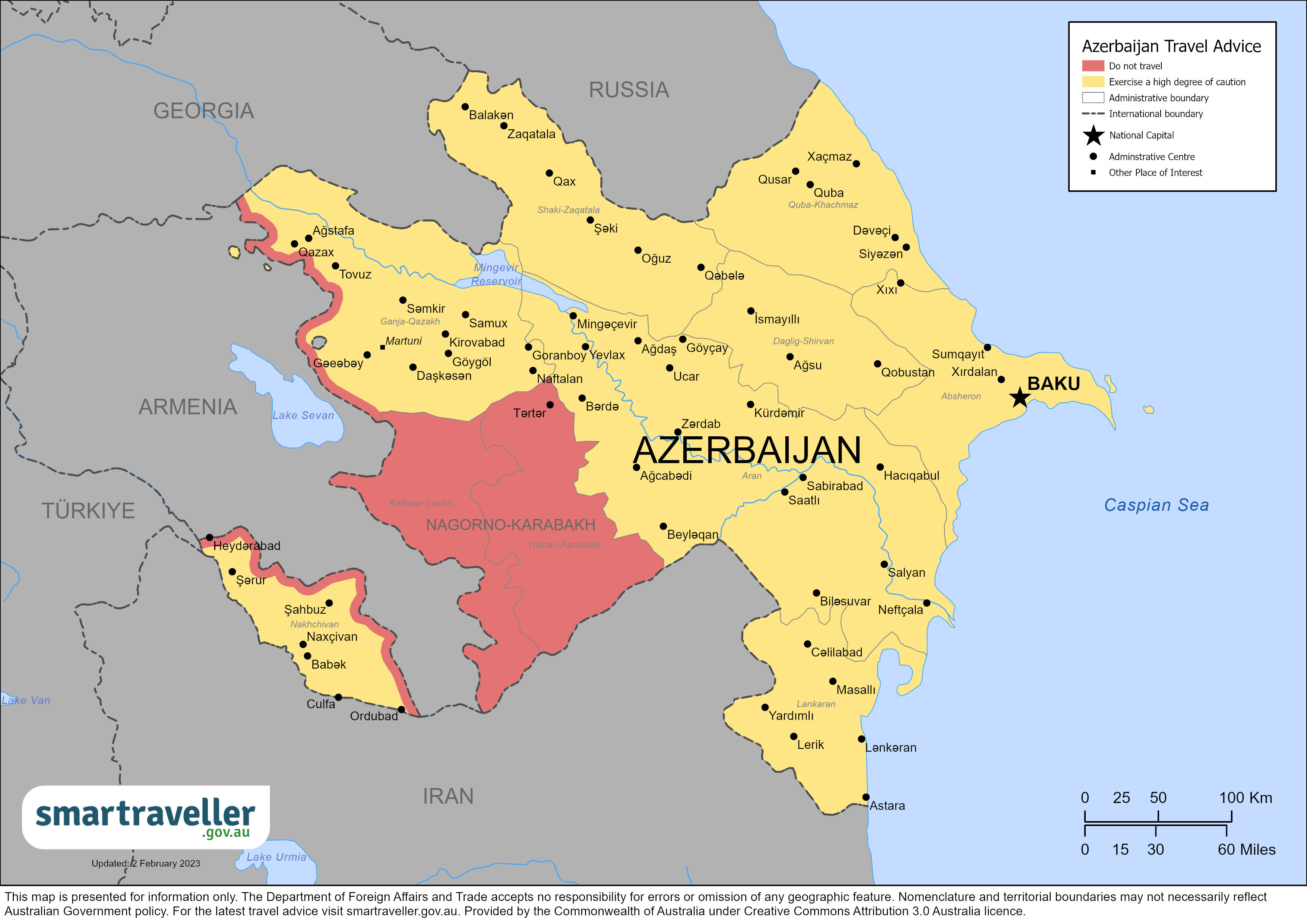
Azerbaijan (PDF 222.56 KB)
Europe (PDF 2.62 MB)
Local emergency contacts
Fire and rescue services, medical emergencies.
Call 112 for the emergency hotline.
Advice levels
Exercise a high degree of caution in Azerbaijan overall.
Exercise a high degree of caution in Azerbaijan overall due to the threat of terrorism.
Do not travel to Armenia-Azerbaijan border areas or Nagorno-Karabakh and surrounding military occupied areas.
Do not travel to:
- Armenia-Azerbaijan border areas due to the risk of armed clashes
- Nagorno-Karabakh and surrounding areas due to unmarked landmines.
- Terrorist attacks could occur anywhere and at any time. Be alert to possible threats, especially in public places. Terrorists may target tourist areas and attractions or other places frequented by foreigners. Take official warnings seriously. If there's a security incident, follow the advice of local authorities. There's an increased threat of attacks against Israel and Israeli interests.
- Nagorno-Karabakh and the surrounding region can have unmarked landmines. There is limited infrastructure. If, despite our advice, you travel to these areas, get professional security advice.
- Protests can turn violent. Avoid large public gatherings and exercise heightened caution in locations where foreigners may gather.
- Violent crime is rare in Azerbaijan, but foreigners have reported serious crimes, including home burglaries, robbery and assault. Be alert when walking after dark, including near hotels and residential areas. Don't use unofficial taxis. Don't use ATMs on the street.
Full travel advice: Safety
- Medical facilities are adequate in private hospitals in Baku. Services in government hospitals and rural areas are often limited.
- If you're seriously ill or injured, you may need medical evacuation to Turkiye or Western Europe. Ensure your travel insurance covers this.
- Foodborne, waterborne and other infectious diseases include typhoid, hepatitis and brucellosis. Drink only boiled or bottled water. Avoid raw or undercooked food. Avoid unpasteurised dairy products.
Full travel advice: Health
- Always carry your passport and visa with you. The police can fine or detain you if you don't show a valid travel document when asked.
- Ensure you have the proper permits for buying antiques or cultural artefacts. It's illegal to export them without an official certificate and receipt of purchase. Export rules apply to religious objects, carpets, artworks and caviar. Check with local authorities before you export any items.
- It's illegal to convert a person to another faith.
- Most of Azerbaijan is conservative. Public displays of affection may not be welcome. Same-sex relations are legal but aren't widely accepted. LGBTI people may face discrimination, intolerance or violence based on sexuality and gender identity.
Full travel advice: Local laws
- You'll need a visa to visit Azerbaijan. You can apply for an electronic visa valid for 90 days.
- Contact the nearest embassy or consulate of Azerbaijan for details about visas, currency, customs and quarantine rules.
Full travel advice: Travel
Local contacts
- The Consular Services Charter details what we can and can't do to help you overseas.
- Australia doesn't have an embassy in Azerbaijan. For consular assistance, contact the Australian Embassy in Turkiye .
- You can also get limited consular assistance from the British Embassy in Baku . They can't provide notarial services or issue Australian passports.
- Follow the embassy's social media accounts to stay up to date with local information.
Full travel advice: L ocal contacts
Full advice
Terrorist attacks could occur anywhere and at any time. Be alert to possible threats, especially in public places. Terrorists may target tourist areas, attractions, or other places frequented by foreigners.
Exercise heightened caution in locations where foreigners and large crowds may gather.
Possible targets include:
- places of worship or religious holidays
- hotels, clubs, restaurants and cafes
- markets and shopping malls
- outdoor recreation events
To stay safe:
- be aware while in places known to be possible targets
- report suspicious activities or items to the police
- check the media for new threats
- take official warnings seriously
- follow the instructions of local authorities
If there is an attack, leave the area as soon as it's safe to do so.
Terrorism is a threat worldwide.
More information:
Civil unrest and political tension
Demonstrations and protests
Public protests and events that draw large groups of people can turn violent. Police sometimes use force to break up demonstrations.
To stay safe during periods of unrest:
- avoid public protests and rallies
- monitor local media and other sources
- follow the advice of local authorities
- Demonstrations and civil unrest
Conflict zones
The region of Nagorno-Karabakh is now under the control of Azerbaijan following military action in September 2023.
We recommend you do not travel to Armenia-Azerbaijan border areas or Nagorno-Karabakh.
Nagorno-Karabakh and the surrounding region can have unmarked landmines. There is limited infrastructure. If, despite our advice, you travel to these areas, get professional security advice.
Serious crime
Violent crime is rare in Azerbaijan.
Foreigners have reported serious crime, including home burglaries, robbery and assault .
Be careful walking after dark, including near hotels and in residential areas.
Drink and food spiking
Watch out for drink and food spiking. This can occur in bars and nightclubs in Baku. You're at higher risk of theft if you get drugged.
Never accept food or drinks from strangers or new acquaintances. Never leave food or drinks unattended.
Petty crime and scams
Petty crime, such as pickpocketing, can happen. Take care at outdoor markets and on public transport, including the Baku Metro.
Travellers and expats have reported thieves posing as police officers who demand money. Ask to follow the police officer to the nearest station to pay the fine.
Avoid using unofficial taxis. Ask your hotel to arrange one, or go to an official taxi rank.
Use ATMs in controlled areas, like banks, shops and shopping centres. Avoid ATMs that open onto the street, especially at night.
Cyber security
You may be at risk of cyber-based threats during overseas travel to any country. Digital identity theft is a growing concern. Your devices and personal data can be compromised, especially if you're connecting to Wi-Fi, using or connecting to shared or public computers, or to Bluetooth.
Social media can also be risky in destinations where there are social or political tensions or laws that may seem unreasonable by Australian standards. Travellers have been arrested for things they have said on social media. Don't comment on local or political events on your social media.
- Cyber security when travelling overseas
Kidnapping occurs across the world with political, ideological, and criminal motives. Foreigners, including Australians, have been kidnapped overseas whilst travelling. Kidnaps can happen anywhere, anytime, including destinations that are typically at lower risk. If despite our advice, you travel to an area with a high risk of kidnapping our ability to provide consular assistance in these destinations is limited. To reduce the risk of kidnapping:
- always be alert to your personal security and surroundings
- get professional security advice for travel in locations with a heightened kidnap risk
- check your accommodation has appropriate security measures
- avoid isolated locations, particularly when travelling alone
- notify family or friends of planned travel and share your location
- avoid talking about your money or business affairs
- use ATMs in public places and during daylight hours
- avoid giving personal details to strangers online or over the phone
The Australian Government's longstanding policy is that it doesn't make payments or concessions to kidnappers. Ransom payments to kidnappers have funded further terrorist attacks and criminal activity. Paying a ransom to terrorist groups will likely break Australian counter-terrorism financing laws. More information:
Climate and natural disasters
Earthquakes can happen in Azerbaijan.
To protect yourself if there's a natural disaster or severe weather :
- secure your passport in a safe, waterproof location
- keep in contact with friends and family
- check local media and other sources
Register with the Global Disaster Alert and Coordination System to receive alerts on major disasters.
Travel insurance
Get comprehensive travel insurance before you leave.
Your policy needs to cover all overseas medical costs, including medical evacuation. The Australian Government won't pay for these costs.
If you can't afford travel insurance, you can't afford to travel. This applies to everyone, no matter how healthy and fit you are.
If you're not insured, you may have to pay many thousands of dollars up-front for medical care.
- what activities and care your policy covers
- that your insurance covers you for the whole time you'll be away
Physical and mental health
Consider your physical and mental health before you travel, especially if you have an existing medical condition.
See your doctor or travel clinic to:
- have a basic health check-up
- ask if your travel plans may affect your health
- plan any vaccinations you need
Do this at least 8 weeks before you leave.
If you have immediate concerns for your welfare or the welfare of another Australian, call the 24-hour Consular Emergency Centre on +61 2 6261 3305 or contact your nearest Australian Embassy, High Commission or Consulate to discuss counselling hotlines and services available in your location.
- General health advice
- Healthy holiday tips (Healthdirect Australia)
Medications
Not all medication available over the counter or by prescription in Australia is available in other countries. Some may even be considered illegal or a controlled substance, even if prescribed by an Australian doctor.
In Azerbaijan, many painkillers and other prescription narcotics available in Australia are subject to strict restrictions. You should avoid carrying or shipping these medications. If you plan to bring medication, check if it's legal in Azerbaijan. Take enough legal medicine for your trip.
Carry a letter from your doctor stating:
- what the medication is
- your required dosage
- that it's for personal use
For more information, contact the Azerbaijan Embassy in Canberra: [email protected] .
Health risks
HIV/AIDS is common. Take precautions if you engage in activities that may expose you to the virus.
Other health risks
Foodborne, waterborne and other infectious diseases are common. These include:
- tuberculosis
- COVID-19
Serious outbreaks sometimes occur.
To protect yourself from illness:
- drink boiled water or bottled water with sealed lids
- avoid ice cubes
- avoid unpasteurised dairy products
- avoid raw and undercooked food, such as salads
Get medical advice if you have a fever or diarrhoea.
- Infectious diseases
Medical care
Medical facilities.
Medical facilities are adequate in private hospitals in Baku.
Services in government hospitals and other areas of the country are often limited. Shortages of basic medical supplies are common.
Serious illness or injury may require evacuation to Turkiye or Western Europe. Make sure your insurance covers this. Medical evacuation can be very expensive.
Doctors and hospitals will usually need up-front payment before treatment.
Critical care for Australians who become seriously ill is likely to be significantly below the standards available in Australia.
You're subject to all local laws and penalties, including those that appear harsh by Australian standards. Research local laws before travelling.
If you're arrested or jailed, the Australian Government will do what it can to help you under our Consular Services Charter . But we can't get you out of trouble or out of jail.
Penalties for drug offences are severe. They can include long prison sentences and heavy fines.
- Carrying or using drugs
Always carry your passport and visa. Routine police checks in public and tourist spots are common.
You could be fined or jailed if you don't show a valid travel document when asked.
In Azerbaijan, it's illegal to:
- visit or take photos of military equipment and sites
- take photos of military personnel
- buy antique or cultural artefacts without a permit
- export antiques or cultural artefacts without an official certificate and receipt of purchase
- convert a person to another faith
Export rules apply to religious objects, carpets, artworks and caviar. Check with local authorities before you export any items.
If you're suspected of a crime, even a minor crime, you may have to stay in Azerbaijan while your case is investigated. This may last for several months.
Australian laws
Some Australian criminal laws still apply when you're overseas. If you break these laws, you may face prosecution in Australia.
- Staying within the law and respecting customs
Dual citizenship
Azerbaijan doesn't recognise dual nationality.
If you're a dual Australian-Azerbaijani citizen, this limits the consular services we can give if you're arrested or detained.
Always travel on your Australian passport .
Azerbaijan citizens may need to do military service. If you're an Australian-Azerbaijani dual national, get advice on your service obligations from the embassy or consulate of Azerbaijan . Do this well before you travel.
- Dual nationals
Local customs
The Islamic holiday month of Ramadan is observed in Azerbaijan. Respect religious and cultural customs and laws at this time.
During Ramadan, eating, drinking, and smoking may be illegal in public during the day. If you're not fasting, avoid these activities around people who are. Seek local advice to avoid offence.
Explore our Ramadan page to learn more, including dates for Ramadan.
Dress and behaviour
Dress standards can be conservative outside of Baku. Public displays of affection may not be welcome. Dress conservatively. Take care not to offend. If in doubt, seek local advice.
LGBTQIA+ information
Same-sex relationships are legal but not widely accepted.
Intolerance, discrimination and violence towards LGBTI people happens in Azerbaijan. Avoid public displays of affection.
- Advice for LGBTQIA+ people
Visas and Border measures
Every country or territory decides who can enter or leave through its borders. For specific information about the evidence you'll need to enter a foreign destination, check with the nearest embassy, consulate or immigration department of the destination you're entering.
You'll need a visa to visit Azerbaijan.
You can apply for an electronic visa (e-visa) valid for 90 days. You can do this online through Azerbaijan's Official Electronic Visa Portal . Allow at least 3 business days for processing a standard e-visa and 3 hours for an urgent e-visa (additional service fee applies).
If you don't abide by your visa or permit terms, you may be fined, deported and banned from re-entering Azerbaijan.
Ensure your passport is valid for at least 3 months from the expiry date of the e-visa.
Visa extensions
You can apply to extend or renew your visa through Azerbaijan's State Migration Service . Keep a copy of your passport and existing visa while your application is being processed. The Ministry of Interior Police may ask to see your documents at any time. See Local laws .
- Ministry of Foreign Affairs of the Republic of Azerbaijan
Registering with the police
If you plan to stay in Azerbaijan for over 15 days, you must register with the State Migration Service online (registration upon place of stay) or at regional migration departments ( www.migration.gov.az ), even if you have a 90-day visa. Do this within 10 days of arrival. If you don't, you'll be fined.
You may not be able to leave Azerbaijan until you pay the fine and get an exit permit from the State Migration Service .
Travel via Nagorno-Karabakh
If your passport has visas or stamps from Nagorno-Karabakh, you could be refused entry into Azerbaijan. Land borders are currently closed except for freight.
Travel via neighbouring countries
Travel restrictions may apply to Australians travelling overland from Azerbaijan to neighbouring countries.
Check the nearest embassy or consulate of Azerbaijan for any travel restrictions. You'll also need to check the rules of neighbouring countries.
Some countries won’t let you enter unless your passport is valid for 6 months after you plan to leave that country. This can apply even if you’re just transiting or stopping over.
Some foreign governments and airlines apply the rule inconsistently. Travellers can receive conflicting advice from different sources.
You can end up stranded if your passport is not valid for more than 6 months.
The Australian Government does not set these rules. Check your passport’s expiry date before you travel. If you’re not sure it’ll be valid for long enough, consider getting a new passport .
Lost or stolen passport
Your passport is a valuable document. It's attractive to people who may try to use your identity to commit crimes.
Some people may try to trick you into giving them your passport. Always keep it in a safe place.
If your passport is lost or stolen, tell the Australian Government as soon as possible:
- In Australia, contact the Australian Passport Information Service .
- If you're overseas, contact the nearest Australian embassy or consulate .
Passport with 'X' gender identifier
Although Australian passports comply with international standards for sex and gender, we can’t guarantee that a passport showing 'X' in the sex field will be accepted for entry or transit by another country. Contact the nearest embassy, high commission or consulate of your destination before you arrive at the border to confirm if authorities will accept passports with 'X' gender markers.
- LGBTQIA+ travellers
Azerbaijan's currency is the Azerbaijani Manat (AZN).
Declare any amount of foreign currency on arrival. This covers all forms of currency, not only cash.
You can export up to $US10,000 without documentation. Contact the embassy or consulate of Azerbaijan for details.
Azerbaijan is a cash-based economy. You'll need to pay in local currency for many goods and services.
US dollars and euros are also common. You can change notes in good condition for local currency.
Credit cards are becoming more common in major cities. They may not be accepted in smaller restaurants and stores.
Traveller's cheques aren't often accepted, except in major hotels, some restaurants and banks.
ATMs are available in major cities.
Local travel
Driving permit.
You can drive in Azerbaijan with a current Australian driver's licence. Foreigners staying for more than one month may need to get a local driver's licence through ASAN Service Offices.
You may also need an International Driving Permit (IDP) for travel and car insurance. Check with your insurer and car provider before you drive.
Road travel
Driving in Azerbaijan can be dangerous. Common dangers include:
- roads and vehicles in poor condition
- drivers who ignore traffic signals and rules
- high-speed crashes that cause serious injury or death
- rural roads without lights or road signs
- sharing the road with pedestrians, slow-moving farm equipment and livestock
Right-hand drive cars are illegal in Azerbaijan.
It's illegal to drive with a blood alcohol reading above 0%.
Before you drive in Azerbaijan:
- check if your travel insurance will cover you
- get to know local road rules
Look out for pedestrians, livestock and farm equipment when you drive, particularly in rural areas.
- Driving or riding
Use registered taxis and authorised limousines. It's best to get your hotel to arrange a taxi for you.
Avoid flagging down taxis in the street.
Always use an official taxi rank.
Sit in the back seat rather than the front.
Public transport
Public transport can be overcrowded, especially buses. It may not meet Australian safety standards.
Take care of your belongings because petty crime occurs.
- Transport and getting around safely
Rail travel
The Baku Metro has standard safety equipment and procedures. Metro signs are in Azerbaijani.
To reduce your risks if you travel by overland train:
- secure your valuables
- don't leave the compartment unattended
- lock the door of your compartment from the inside
Before you travel on Azerbaijan's domestic airlines, be aware that:
- planes may not meet international standards for maintenance
- overbooking and overcrowding is common
- cancellations and delays can occur without explanation
DFAT doesn't provide information on the safety of individual commercial airlines or flight paths.
Check Azerbaijan's air safety profile with the Aviation Safety Network.
Emergencies
Depending on what you need, contact your:
- family and friends
- travel agent
- insurance provider
Always get a police report when you report a crime.
Your insurer should have a 24-hour emergency number.
Consular contacts
Read the Consular Services Charter for what the Australian Government can and can't do to help you overseas.
Australia doesn't have an embassy in Azerbaijan. For consular help, contact the Australian Embassy in Turkiye.
Australian Embassy, Ankara
MNG Building, 7th Floor 88 Uĝur Mumcu Caddesi Gaziosmanpaşa, Ankara Turkey Phone: +90 312 459 9500 Fax: +90 312 446 4827 Website: turkey.embassy.gov.au Email: [email protected] Facebook: Australia in Turkiye X: @AusAmbTurk iye
Check the Embassy website for details about opening hours and any temporary closures.
Limited consular assistance (not including notarial services or the issue of Australian passports) is available from the British Embassy in Baku.
British Embassy, Baku
45 Khagani Street Baku 1010 Azerbaijan Phone: (+994 12) 437 7878 Fax: (+994 12) 497 7434 Website: gov.uk/world/organisations/british-embassy-baku
24-hour Consular Emergency Centre
In a consular emergency, if you can't contact an embassy, call the 24-hour Consular Emergency Centre on:
- +61 2 6261 3305 from overseas
- 1300 555 135 in Australia

Travelling to Azerbaijan?
Sign up to get the latest travel advice updates..
Be the first to know official government advice when travelling.
Security Alert May 17, 2024
Worldwide caution.
- Travel Advisories |
- Contact Us |
- MyTravelGov |
Find U.S. Embassies & Consulates
Travel.state.gov, congressional liaison, special issuance agency, u.s. passports, international travel, intercountry adoption, international parental child abduction, records and authentications, popular links, travel advisories, mytravelgov, stay connected, legal resources, legal information, info for u.s. law enforcement, replace or certify documents.
Before You Go
Learn About Your Destination
While Abroad
Emergencies
Share this page:
Travel Advisory November 2, 2023
Azerbaijan - level 2: exercise increased caution.
Reissued after periodic review with general security updates.
Exercise increased caution in Azerbaijan due to terrorism concerns and areas of armed conflict . Some areas have increased risk. Read the entire Travel Advisory.
Do not travel to:
- The border region with Armenia.
- The Nagorno-Karabakh region and surrounding territories due to recent hostilities.
Country Summary: Terrorist groups that continue to plot attacks pose a risk in Azerbaijan. Terrorists may attack with little or no warning, targeting tourist locations, transportation hubs, markets/shopping malls, local government facilities, hotels, clubs, restaurants, places of worship, parks, major sporting and cultural events, educational institutions, airports, and other public areas.
Until September 2020 the territory of Nagorno-Karabakh and seven surrounding territories were under Armenian control. Following armed hostilities in the fall of 2020 and fall of 2023, Azerbaijan took control of these seven territories and Nagorno-Karabakh. Further military activity could occur in the region.
Read the country information page for additional information on travel to Azerbaijan.
If you decide to travel to Azerbaijan:
- Enroll in the Smart Traveler Enrollment Program ( STEP ) to receive Alerts and make it easier to locate you in an emergency.
- Follow the Department of State on Facebook and Twitter .
- Review the Country Security Report for Azerbaijan.
- Avoid demonstrations.
- Stay alert in locations frequented by foreigners.
- Monitor local media for breaking events and adjust your plans based on new information.
- Prepare a contingency plan for emergency situations. Review the Traveler’s Checklist .
- Visit the CDC page for the latest Travel Health Information related to your travel.
- Visit our website for Travel to High-Risk Areas .
Border with Armenia– Level 4: Do Not Travel There is the potential for fighting along the Azerbaijan-Armenia border as part of the ongoing armed conflict. U.S. citizens should avoid the area. Exercise caution on roads near Azerbaijan’s border with Armenia. Be aware that some portions of the road may cross international boundaries without notice. Roads may be controlled by checkpoints or closed to travelers without notice. The U.S. embassy has prohibited embassy employees and their families from non-essential travel to the border region.
Nagorno-Karabakh – Level 4: Do Not Travel The U.S. government is unable to provide emergency services to U.S. citizens in and around Nagorno-Karabakh due to landmine contamination and restricted access.
Embassy Messages
View Alerts and Messages Archive
Quick Facts
One page per stamp
Travelers may bring in any amount of foreign currency as long as they declare it upon arrival.
Travelers may depart with up to $10,000 undeclared, or up to $50,000 or equivalent if they provide documents showing they declared the amount to customs upon arrival.
Embassies and Consulates
U.s. embassy baku.
111 Azadliq Prospekti AZ1007 Baku, Azerbaijan Telephone: +(994) (12) 488-3300 Emergency After-Hours Telephone: +(994) (12) 488-3300 Fax: +(994) (12) 488-3695 Email: [email protected]
Destination Description
See the Department of State’s Fact Sheet on Azerbaijan for information on U.S.-Azerbaijan relations.
Entry, Exit and Visa Requirements
You need a passport and a visa to enter Azerbaijan . Acquire a visa that covers the dates of your trip before you go. Visit the Embassy of Azerbaijan’s website for the most current visa information.
- Electronic visas ( E-Visas ) are available through the “ASAN Visa” system.
- An E-Visa is typically issued within 3 (three) working days of the online application, is a single-entry visa, and is valid for 90 days . The E-Visa fee is $20, paid electronically. Once approved, the E-Visa is sent to the applicant via email. Travelers must print this information and present it to border security officials on arrival in Azerbaijan.
- Multiple-entry visas valid for up to 365 days are available through the Embassy of Azerbaijan.
- You must register with the State Migration Service (SMS) within 15 calendar days of arrival if your intended period of stay is more than 15 days. Visit the State Migration Service website for the most current registration information.
- Law enforcement officials have at times detained individuals from Armenia or with Armenian surnames for questioning or denied them entry into the country. Such individuals may encounter anti-Armenian sentiments while in Azerbaijan.
- Individuals with “Republic of Artsakh” entry stamps in their passport could be questioned or denied entry upon arrival to Azerbaijan.
Land Borders: Land borders between Azerbaijan and all neighboring countries remain closed, except for freight transportation. Entry into Azerbaijan is possible only by air. Foreigners are permitted to exit by land.
Some HIV/AIDS entry restrictions exist for visitors to, and foreign residents of, Azerbaijan. Medical tests are required for those applying for temporary or permanent residence permits and must be performed at designated clinics in Azerbaijan.
Please verify this information with the Embassy of Azerbaijan before you travel.
Find information on dual nationality , prevention of international child abduction and customs regulations on our websites
Safety and Security
Terrorism: Terrorist groups and those inspired by such organizations are intent on attacking U.S. citizens abroad. Terrorists are increasingly using less sophisticated methods of attack – including knives, firearms, vehicles and rudimentary IEDs– to more effectively target crowds. Frequently, their aim is unprotected or vulnerable targets, such as:
- High-profile public events (sporting contests, political rallies, demonstrations, holiday events, celebratory gatherings, etc.)
- Hotels, clubs, and restaurants frequented by tourists
- Places of worship
- Shopping malls and markets
- Public transportation systems (including subways, buses, trains, and scheduled commercial flights)
For more information, see our Terrorism page.
The Nagorno-Karabakh Area and Conflict:
- The U.S. Government is unable to provide emergency services to U.S. citizens in and around Nagorno-Karabakh.
- Exercise caution near the Azerbaijan-Armenia border. Despite the declaration of a cessation in hostilities, the danger posed by intermittent gunfire, land mines, and poor road conditions continue. Roads near the conflict zone may be controlled by checkpoints or closed to travelers without notice .
- For more information regarding business and commercial activities in these areas, please visit the Investment Climate Statement .
U.S. citizens of Armenian descent may encounter anti-Armenian sentiments in Azerbaijan.
Exercise caution in the region of Nardaran , located approximately 28 miles (45 km) from Baku on the Absheron Peninsula. Nardaran is culturally conservative and has been the site of several anti-United States and anti-Israel protests. It has also been the subject of government raids, which have sometimes resulted in violence.
Crime: Crime is relatively low and violent crime is infrequent. The majority of reported crimes involve burglary, assault , or petty crime such as pickpocketing .
- Be careful in areas that attract large crowds or are very isolated. Criminals have targeted foreigners walking alone, late at night, or under the influence of alcohol.
- Some women have reported incidents of unwanted male attention while walking alone and taking taxis. Sexual assault may be underreported due to cultural stigma.
- Financial scams are increasingly common. While the majority involves internet dating, there are reports of scams related to fraudulent real estate deals, licensing requirements, and travel advertisements.
- There are reports of increased credit and bank card fraud , such as credit card skimming.
International Financial Scams: See the Department of State and the FBI pages for information on scams.
Avoid demonstrations and riots, which police have previously suppressed with force . Demonstrations occur periodically. They may take place in response to political or economic issues, on politically significant holidays, and during international events.
- Demonstrations can be unpredictable, avoid areas around protests and demonstrations.
- Check local media for updates and traffic advisories.
Victims of Crime: U.S. citizens who are victims of crime should report crimes to the local police and then contact the U.S. Embassy. Contact the local police by dialing 102 and contact the U.S. Embassy at (+994 12) 488 3300. Remember that local authorities are responsible for investigating and prosecuting crimes.
See our webpage on help for U.S. victims of crime overseas .
- Help you find appropriate medical care
- Assist you in reporting a crime to the police
- Contact relatives or friends with your written consent
- Provide general information regarding the victim’s role during the local investigation and following its conclusion
- Provide a list of local attorneys
- Provide our information on victim’s compensation programs in the U.S.
- Provide an emergency loan for repatriation to the United States and/or limited medical support in cases of destitution
- Help you find accommodation and arrange flights home
- Replace a stolen or lost passport
Domestic Violence: U.S. citizen victims of domestic violence are encouraged to contact the U.S. Embassy for assistance identifying local resources for victims of domestic violence, which can include shelters, medical assistance, and legal aid. Victims may contact the State Committee for Family, Women, and Children Affairs by telephone at (+994 12) 498 00 92 or [email protected] for assistance.
Tourism: The tourism industry is unevenly regulated, and safety inspections for equipment and facilities do not commonly occur. Hazardous areas/activities are not always identified with appropriate signage, and staff may not be trained or certified either by the host government or by recognized authorities in the field. In the event of an injury, appropriate medical treatment is typically available only in Baku. First responders are generally unable to access areas outside of Baku and to provide urgent medical treatment. U.S. citizens are encouraged to purchase medical evacuation insurance .
Local Laws & Special Circumstances
Criminal Penalties: You are subject to local laws. If you violate local laws, even unknowingly, you may be expelled, arrested, or imprisoned. You can be legally detained in jail for up to four months during an investigation. Individuals establishing a business or practicing a profession that requires permits or licensing should seek information from the competent local authorities, prior to practicing or operating a business.
Furthermore, some crimes are also prosecutable in the United States, regardless of local law. For examples, see our website on crimes against minors abroad and the Department of Justice website.
Arrest Notification: If you are arrested or detained, ask police or prison officials to notify the U.S. Embassy immediately. There are often delays in consular notification after arrests of U.S. citizens. See our webpage for further information.
Restrictions on Photography: It is illegal to take photographs of military installations and equipment. Police may stop you even if you take photographs of non-military sites, like oil fields, buildings, and public squares. Cooperate with the police.
Military Service : Azerbaijan has mandatory military service for male citizens ages 18 to 35. If Azerbaijan considers you a citizen, you could face fines or arrest if you have not completed your military service. Dual citizen males ages 18 to 35 have been prevented from departing Azerbaijan on U.S. or Azerbaijan passports – until they resolved military service requirements with the Azerbaijan government. The U.S. Embassy in Baku cannot resolve this issue for affected individuals. Information regarding Azerbaijan’s mandatory military service, including contact information, can be found on Azerbaijan’s State Service for Mobilization and Conscription website . Information about renouncing Azerbaijani citizenship is available through the Embassy of Azerbaijan .
Drones: Azerbaijan does not allow the import of drones without prior authorization. Drones brought into the country without authorization are subject to confiscation by customs officials.
Customs: Taking carpets, artwork, and other cultural artifacts out of the country requires an export certificate. Consult the seller or the Azerbaijan National Carpet Museum for assistance.
Counterfeit and Pirated Goods: Although counterfeit and pirated goods are prevalent in many countries, they may still be illegal according to local laws. You may also pay fines or have to give them up if you bring them back to the United States. See the U.S. Department of Justice website for more information.
Faith-Based Travelers: See the following webpages for details:
- Faith-Based Travel Information
- International Religious Freedom Report – see country reports
- Human Rights Report – see country reports
- Hajj Fact Sheet for Travelers
- Best Practices for Volunteering Abroad
LGBTQI+ Travelers: Lesbian, gay, bisexual, transgender, queer, and intersex (LGBTQI+) individuals are not specifically protected by antidiscrimination laws. Societal intolerance, discrimination, and violence based on sexual orientation and gender identity remain a problem in Azerbaijan. It is not illegal to organize events in support of LGBTQI+ persons, but societal intolerance generally prevented these events. LGBTQI+ individuals have reported that employers sometimes found other reasons to fire LGBTQI+ employees due to their sexual orientation or gender identity. One of the main concerns for local LGBTQI+ persons is the perceived failure of law enforcement agencies to act on violations of the rights of LGBTQI+ persons and indifference to investigating crimes committed against LGBTQI+ persons in Azerbaijan. The Department of State’s Human Rights Report documents incidents of police brutality against individuals based on sexual orientation and notes that authorities did not investigate or punish those responsible.
See our LGBTQI+ Travel Information page and section 6 of our Human Rights report for further details.
Travelers with Disabilities : Azerbaijani law prohibits discrimination against persons with physical, sensory, intellectual, or mental disabilities, but accessibility for persons with disabilities is limited throughout the country. Expect accessibility to be limited in transportation, lodging, and general infrastructure.
Students: See our Students Abroad page and FBI travel tips .
Women Travelers: See our travel tips for Women Travelers .
For emergency medical services in Azerbaijan, dial 103 .
Ambulance services are widely available, but training and availability of emergency responders may be below U.S. standards. Ambulances are typically not staffed with trained paramedics and often have little or no medical equipment. Injured or seriously ill travelers may prefer to take a taxi or private vehicle to the nearest major hospital rather than wait for an ambulance.
We do not pay medical bills. Be aware that U.S. Medicare/Medicaid does not apply overseas. Most hospitals and doctors overseas do not accept U.S. health insurance.
Medical Insurance: Make sure your health insurance plan provides coverage overseas. Most care providers overseas only accept cash payments. See our webpage for more information on overseas insurance coverage. Visit the U.S. Centers for Disease Control and Prevention for more information on type of insurance you should consider before you travel overseas
We strongly recommend you obtain supplemental insurance to cover medical evacuation.
Always carry your prescription medication in original packaging, along with your doctor’s prescription. Check with the Embassy of Azerbaijan or the State Customs Committee to ensure the medication is legal in Azerbaijan.
Vaccinations: Be up to date on all vaccinations recommended by the U.S. Centers for Disease Control and Prevention.
- World Health Organization
- U.S. Centers for Disease Control and Prevention (CDC)
Air Quality: Visit AirNow for information on air quality at U.S. Embassies and Consulates. Baku is estimated to have air pollution levels higher than those in major U.S. cities.
The U.S. Embassy maintains a list of doctors and hospitals . We do not endorse or recommend any specific medical provider or clinic.
Health Facilities in General:
- Adequate health facilities are available in Baku but some facilities in Baku and in other areas, particularly in rural areas, may be below U.S. standards.dequate health facilities are available in Baku but some facilities in Baku and in other areas, particularly in rural areas, may be below U.S. standards.
- Hospitals and doctors often require payment “up front” prior to service or admission. Credit card payment is not always available. Most hospitals and medical professionals require cash payment in advance.
- Private hospitals usually require advance payment or proof of adequate insurance before admitting a patient.
- Travelers should make efforts to obtain complete information on billing, pricing, and proposed medical procedures before agreeing to any medical care.
- Medical staff may speak little or no English.
- Patients bear all costs for transfer to or between hospitals.
- Psychological and psychiatric services are limited, even in Baku.
Medical Tourism and Elective Surgery:
- Medical tourism is a rapidly growing industry. People seeking health care overseas should understand that medical systems operate differently from those in the United States and are not subject to the same rules and regulations. Anyone interested in traveling for medical purposes should consult with their local physician before traveling and visit the U.S. Centers for Disease Control and Prevention website for more information on Medical Tourism.
- We strongly recommend supplemental insurance to cover medical evacuation in the event of unforeseen medical complications.
Your legal options in case of malpractice are very limited in Azerbaijan.
Pharmaceuticals:
- Exercise caution when purchasing medication overseas. Pharmaceuticals, both over the counter and requiring prescription in the United States, are often readily available for purchase with few controls. Counterfeit medication is common and may prove to be ineffective, the wrong strength, or contain dangerous ingredients. Medication should be purchased in consultation with a medical professional and from reputable establishments.
- U.S. Customs and Border Protection and the Food and Drug Administration are responsible for rules governing the transport of medication back to the United States. Medication purchased abroad must meet their requirements to be legally brought back into the United States. Medication should be for personal use and must be approved for usage in the United States. Please visit the U.S. Customs and Border Protection and the Food and Drug Administration websites for more information.
- Azerbaijan imposes strict restrictions on the importation of many pain killers and other prescription narcotics available in the United States. Travelers should avoid carrying or shipping such medications. If travelers must bring such medications, they should bring diagnosis and prescription paperwork from a licensed practitioner in the United States.
- Many locations in Azerbaijan, such as Shahdagh and Tufandag, are at high altitude. Be aware of the symptoms of altitude sickness, and take precautions before you travel. Visit the U.S. Centers for Disease Control and Prevention website for more information about Travel to High Altitudes .
Water Quality:
- In many areas, tap water is not potable. Bottled water and beverages are generally safe, although you should be aware that many restaurants and hotels serve tap water unless bottled water is specifically requested. Be aware that ice for drinks may be made using tap water.
Adventure Travel
- Visit the U.S. Centers for Disease Control and Prevention website for more information about Adventure Travel .
General Health Language:
The following diseases are prevalent:
- Tuberculosis
Travel and Transportation
Road Conditions and Safety: The information below is provided for general reference only.
- Road conditions in Azerbaijan differ significantly from those in the United States. Exercise caution when driving in Azerbaijan.
- Reckless driving is very common. Many drivers do not pay attention to traffic regulations, signals, lane markings, pedestrians, or other drivers. Drivers often travel at extremely high speeds, and accidents are frequent and often serious.
- Older sections of the roadway system are poorly constructed and poorly lit. Many rural roads are largely unpaved. Driving hazards, such as open manholes, debris, and potholes are common in Baku.
- Unfinished road sections may be extremely dangerous due to lack of proper construction and hazard signage.
- Watch out for pedestrians. Pedestrians routinely disregard vehicles, crosswalks, signs and signals, and in general act carelessly.
- Exercise caution on roads near the border with Armenia. Be aware that some portions of the road may cross international boundaries without notice. Roads may be controlled by checkpoints or closed to travelers without notice.
Traffic Laws: Vehicles drive on the right. Routine traffic stops are common. If you are driving, keep all required documents with you, including passport or local registration documents, driver’s license, vehicle registration documents, and proof of insurance.
- Foreigners residing in Azerbaijan for more than 30 days must obtain a local driver’s license through ASAN Xidmet .
- Azerbaijan has strict laws about driving under the influence of alcohol. It is illegal to drive with any measurable amount of alcohol in your system.
Public Transportation:
- The Baku metro system is an inexpensive option for transportation. Security cameras provide excellent coverage of all metro platforms throughout the system. There are police units at each metro station, and bag checks may be carried out at the entrance to each station.
- Because safety and licensing standards do not match those found in the United States, U.S. Embassy personnel are not authorized to use public buses.
- For safety, we recommend using only marked taxis if you choose to take one.
- Public transportation throughout the rest of the country remains overcrowded and poorly maintained .
See our Road Safety page for more information.
Aviation Safety Oversight: The U.S. Federal Aviation Administration (FAA) has assessed the Government of Azerbaijan’s State Civil Aviation Administration as in compliance with International Civil Aviation Organization (ICAO) aviation safety standards. Further information may be found on the FAA’s safety assessment page .
Maritime Travel: Mariners planning travel to Azerbaijan should also check for U.S. maritime advisories and alerts . Information may also be posted to the U.S. Coast Guard homeport website , and the NGA broadcast warnings .
For additional travel information
- Enroll in the Smart Traveler Enrollment Program (STEP) to receive security messages and make it easier to locate you in an emergency.
- Call us in Washington, D.C. at 1-888-407-4747 (toll-free in the United States and Canada) or 1-202-501-4444 (from all other countries) from 8:00 a.m. to 8:00 p.m., Eastern Standard Time, Monday through Friday (except U.S. federal holidays).
- See the State Department’s travel website for the Worldwide Caution and Travel Advisories .
- Follow us on X (formerly known as "Twitter") and Facebook .
- See traveling safely abroad for useful travel tips.
Review information about International Parental Child Abduction in Azerbaijan . For additional IPCA-related information, please see the International Child Abduction Prevention and Return Act (ICAPRA) report.
Travel Advisory Levels
Assistance for u.s. citizens, azerbaijan map, learn about your destination, enroll in step.

Subscribe to get up-to-date safety and security information and help us reach you in an emergency abroad.
Recommended Web Browsers: Microsoft Edge or Google Chrome.
Make two copies of all of your travel documents in case of emergency, and leave one with a trusted friend or relative.
Afghanistan
Antigua and Barbuda
Bonaire, Sint Eustatius, and Saba
Bosnia and Herzegovina
British Virgin Islands
Burkina Faso
Burma (Myanmar)
Cayman Islands
Central African Republic
Cote d Ivoire
Czech Republic
Democratic Republic of the Congo
Dominican Republic
El Salvador
Equatorial Guinea
Eswatini (Swaziland)
Falkland Islands
France (includes Monaco)
French Guiana
French Polynesia
French West Indies
Guadeloupe, Martinique, Saint Martin, and Saint Barthélemy (French West Indies)
Guinea-Bissau
Isle of Man
Israel, The West Bank and Gaza
Liechtenstein
Marshall Islands
Netherlands
New Caledonia
New Zealand
North Korea (Democratic People's Republic of Korea)
Papua New Guinea
Philippines
Republic of North Macedonia
Republic of the Congo
Saint Kitts and Nevis
Saint Lucia
Saint Vincent and the Grenadines
Sao Tome and Principe
Saudi Arabia
Sierra Leone
Sint Maarten
Solomon Islands
South Africa
South Korea
South Sudan
Switzerland
The Bahamas
Timor-Leste
Trinidad and Tobago
Turkmenistan
Turks and Caicos Islands
United Arab Emirates
United Kingdom
Vatican City (Holy See)
External Link
You are about to leave travel.state.gov for an external website that is not maintained by the U.S. Department of State.
Links to external websites are provided as a convenience and should not be construed as an endorsement by the U.S. Department of State of the views or products contained therein. If you wish to remain on travel.state.gov, click the "cancel" message.
You are about to visit:
COVID information
Covid-19 restrictions & advisory.
Last updated on 11/03/2024
The health and safety of our residents and visitors is of utmost priority and the Operational Headquarters under the Cabinet of Ministers of the Republic of Azerbaijan is working closely with the World Health Organization to monitor and limit the transmission of coronavirus (COVID-19).
TRAVEL RESTRICTIONS TO AZERBAIJAN
- From 28 March 2023 at 06:00, entry into and exit out of the Republic of Azerbaijan of all foreign citizens, citizens of other countries permanently residing in those countries and stateless persons was permitted by air transport.
- For more information on available flight options, please visit the official website of Heydar Aliyev International Airport - https://www.airport.az/
- Border officials are taking necessary steps to disinfect land border crossings.
- According to a measure by the Cabinet of Ministers of the Republic of Azerbaijan, dated 18 April 2020, in accordance with Article 25 of the Law of the Republic of Azerbaijan, ‘On Sanitary and Epidemiological Safety’, the special quarantine regime applied in the country has been extended until 1 July 2024 at 06:00.
- Based on an analysis of the global situation in connection with the COVID-19 pandemic and, in order to prevent the spread of the virus in the country, measures on exiting and entering the territory of the Republic of Azerbaijan by overland means of transport across land borders, excluding cargo transportation, as well as restrictions on international and charter flights, have been extended until 1 July 2024.
Travellers are advised to carry additional supplies of necessary medication in carry-on luggage.
GENERAL ADVISORY FOR VISITORS
This advisory serves as a guide to help visitors during your visit to Azerbaijan.
- Monitor your health closely for two weeks.
- If you have a fever or respiratory symptoms (e.g. cough, runny nose), wear a mask.
- Seek medical attention promptly if symptoms do not subside. Call the clinic in advance and inform the doctor of your travel history.
Travellers should always adopt the following precautions:
- Regularly and thoroughly clean your hands with an alcohol-based hand rub or wash them with soap and water.
- Avoid touching your eyes, nose and mouth.
- Avoid close contact with people who are unwell or showing symptoms of illness.
- Cover your mouth and nose with a tissue or bent elbow when coughing or sneezing and dispose of the used tissue immediately.
- Seek medical attention promptly if you have fever, cough and difficulty breathing.
Azerbaijan Tourism Board and the State Tourism Agency are committed to providing a safe environment for all residents and visitors. We thank you for your support and understanding.
FREQUENTLY ASKED QUESTIONS
1. Is it safe to visit Azerbaijan in light of the ongoing spread of COVID-19?
The novel coronavirus (COVID-19) outbreak, which began in December 2019, presents a significant challenge for the entire world. All travellers are recommended to follow the guidelines instructed by the World Health Organisation in preparation for your trip, and to reduce risk of exposure to COVID-19.
2. Will I be at risk of contracting coronavirus if I visit Azerbaijan?
The Operational Headquarters under the Cabinet of Ministers of the Republic of Azerbaijan is working closely with the World Health Organisation to monitor the situation and limit the transmission of the virus. Rest assured, the health and safety of our residents and visitors is of utmost priority and precautionary measures are being taken to minimise risks.
3. Is Azerbaijan restricting travel from any destinations in particular?
When entering the Republic of Azerbaijan, citizens of foreign countries, citizens of other countries permanently residing in those countries and stateless persons no longer require a COVID-19 passport (a document confirming that they have been fully vaccinated against COVID-19 or that they have recovered from COVID-19 and have immunity).
Based on an analysis of the global situation in connection with the COVID-19 pandemic and in order to prevent the spread of the virus in the country, measures on exiting and entering the territory of the Republic of Azerbaijan by overland means of transport across land borders, excluding cargo transportation, as well as restrictions on international and charter flights, have been extended until 1 July 2024.
4. What precautions should I take when travelling to Azerbaijan?
All travellers are recommended to follow the guidelines instructed by the World Health Organisation in preparation for your trip, and to reduce risk of exposure to COVID-19. As such, all travellers should monitor their health closely at this time and seek medical attention promptly if they feel unwell. If they have a fever or respiratory symptoms (e.g. cough, runny nose), they should wear a mask and call any medical establishment before visiting. Other precautions to adopt:
- Regularly and thoroughly clean your hands with an alcohol-based hand rub or wash with soap and water.
- Avoid touching eyes, nose and mouth.
The use of personal equipment protecting respiratory passages is obligatory in transport facilities used for inter-city (inter-regional) and intra-city (intra-regional) passenger transportations, public catering, trade, work and service facilities.
5. Is it safe to visit Azerbaijan’s sights (e.g. malls, landmarks)?
All travellers arriving in Azerbaijan should monitor the local news for closures and restrictions of tourist sights.
6. If I suspect that I have come into contact with the virus, what steps should I take? Will I get access to Azerbaijan medical facilities?
You should seek medical assistance by calling 103 (within Baku), 113 (outside Baku) or 1542.
7. Are tourist facilities in Azerbaijan operating and is a COVID-19 passport required to visit them?
Quarantine regime is being applied in the country until 1 July 2024 at 06:00. To enter specified places (where celebrations are being held, sports and health-rehabilitation facilities, large shopping centres, public catering facilities, hotels, inter-city and inter-district transport routes and other places where such a requirement is established), there is no longer a need for a COVID -19 passport (document confirming full vaccination against COVID-19 or immunity after recovery from COVID-19), regardless of country of citizenship.
8. Can foreign citizens get vaccinated in Azerbaijan? If yes, which vaccines are available?
To get vaccinated in Azerbaijan, foreign citizens need to have a residence or work permit in the country. Those eligible for vaccination need to get registered at the local polyclinic according to the place of residence. Currently, people over age 18 can get vaccinated with Sinovac, Pfizer and Sputnik V, while Vaxzevria is administered to those over 60.
9. Has the outbreak of coronavirus caused serious damage to Azerbaijan’s tourism industry?
The novel coronavirus (COVID-19) outbreak presents a significant challenge for the entire world. At present, the health and safety of our residents and visitors is of utmost priority and precautionary measures are being taken to minimise risks.

You are using an outdated browser. Upgrade your browser today or install Google Chrome Frame to better experience this site.
Azerbaijan Traveler View
Travel health notices, vaccines and medicines, non-vaccine-preventable diseases, stay healthy and safe.
- Packing List
After Your Trip
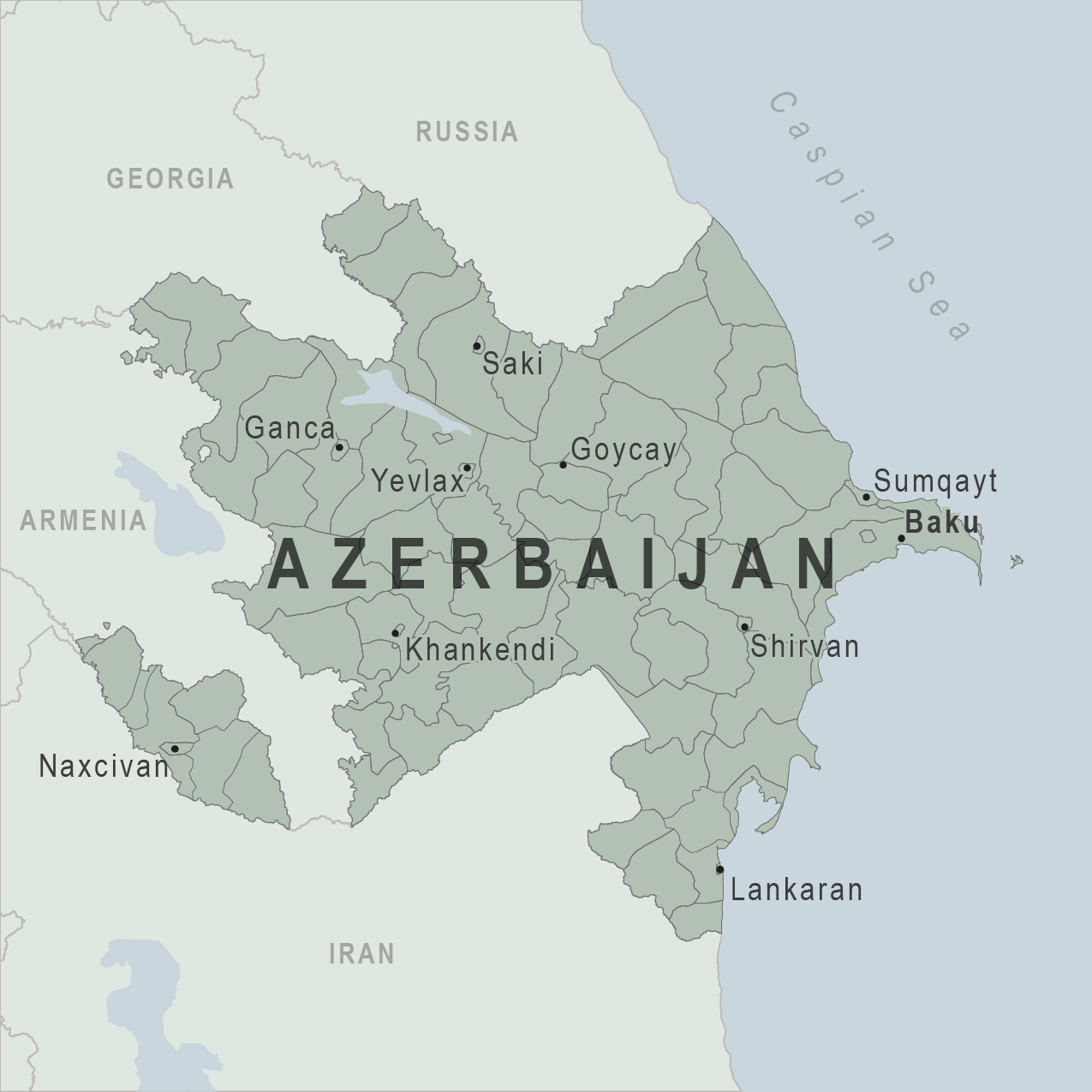
Be aware of current health issues in Azerbaijan. Learn how to protect yourself.
Level 1 Practice Usual Precautions
- Updated Global Measles August 14, 2024 Many international destinations are reporting increased numbers of cases of measles. Destination List: Afghanistan, Angola, Armenia, Austria, Azerbaijan, Belarus, Benin, Bhutan, Bosnia and Herzegovina, Burkina Faso, Burundi, Cameroon, Central African Republic, Chad, Côte d'Ivoire (Ivory Coast), Democratic Republic of the Congo, Djibouti, Equatorial Guinea, Ethiopia, Gabon, Georgia, Ghana, Guinea, India, Indonesia, Kazakhstan, Kyrgyzstan, Lebanon, Liberia, Malaysia, Mali, Mauritania, Mozambique, Niger, Nigeria, Pakistan, Philippines, Qatar, Republic of South Sudan, Republic of the Congo, Romania, Russia, San Marino, Senegal, Somalia, Sri Lanka, Sudan, Syria, Togo, Turkey, United Arab Emirates, Uzbekistan, Yemen, Zambia
⇧ Top
Check the vaccines and medicines list and visit your doctor at least a month before your trip to get vaccines or medicines you may need. If you or your doctor need help finding a location that provides certain vaccines or medicines, visit the Find a Clinic page.
Avoid contaminated water
Leptospirosis
How most people get sick (most common modes of transmission)
- Touching urine or other body fluids from an animal infected with leptospirosis
- Swimming or wading in urine-contaminated fresh water, or contact with urine-contaminated mud
- Drinking water or eating food contaminated with animal urine
- Avoid contaminated water and soil
- Avoid floodwater
Clinical Guidance
Avoid bug bites.
Crimean-Congo Hemorrhagic fever
- Tick bite
- Touching the body fluids of a person or animal infected with CCHF
- Avoid Bug Bites
Leishmaniasis
- Sand fly bite
Airborne & droplet
- Breathing in air or accidentally eating food contaminated with the urine, droppings, or saliva of infected rodents
- Bite from an infected rodent
- Less commonly, being around someone sick with hantavirus (only occurs with Andes virus)
- Avoid rodents and areas where they live
- Avoid sick people
Tuberculosis (TB)
- Breathe in TB bacteria that is in the air from an infected and contagious person coughing, speaking, or singing.
Learn actions you can take to stay healthy and safe on your trip. Vaccines cannot protect you from many diseases in Azerbaijan, so your behaviors are important.
Eat and drink safely
Food and water standards around the world vary based on the destination. Standards may also differ within a country and risk may change depending on activity type (e.g., hiking versus business trip). You can learn more about safe food and drink choices when traveling by accessing the resources below.
- Choose Safe Food and Drinks When Traveling
- Water Treatment Options When Hiking, Camping or Traveling
- Global Water, Sanitation and Hygiene (WASH)
- Avoid Contaminated Water During Travel
You can also visit the Department of State Country Information Pages for additional information about food and water safety.
Prevent bug bites
Bugs (like mosquitoes, ticks, and fleas) can spread a number of diseases in Azerbaijan. Many of these diseases cannot be prevented with a vaccine or medicine. You can reduce your risk by taking steps to prevent bug bites.
What can I do to prevent bug bites?
- Cover exposed skin by wearing long-sleeved shirts, long pants, and hats.
- Use an appropriate insect repellent (see below).
- Use permethrin-treated clothing and gear (such as boots, pants, socks, and tents). Do not use permethrin directly on skin.
- Stay and sleep in air-conditioned or screened rooms.
- Use a bed net if the area where you are sleeping is exposed to the outdoors.
What type of insect repellent should I use?
- FOR PROTECTION AGAINST TICKS AND MOSQUITOES: Use a repellent that contains 20% or more DEET for protection that lasts up to several hours.
- Picaridin (also known as KBR 3023, Bayrepel, and icaridin)
- Oil of lemon eucalyptus (OLE) or para-menthane-diol (PMD)
- 2-undecanone
- Always use insect repellent as directed.
What should I do if I am bitten by bugs?
- Avoid scratching bug bites, and apply hydrocortisone cream or calamine lotion to reduce the itching.
- Check your entire body for ticks after outdoor activity. Be sure to remove ticks properly.

What can I do to avoid bed bugs?
Although bed bugs do not carry disease, they are an annoyance. See our information page about avoiding bug bites for some easy tips to avoid them. For more information on bed bugs, see Bed Bugs .
For more detailed information on avoiding bug bites, see Avoid Bug Bites .
Stay safe outdoors
If your travel plans in Azerbaijan include outdoor activities, take these steps to stay safe and healthy during your trip.
- Stay alert to changing weather conditions and adjust your plans if conditions become unsafe.
- Prepare for activities by wearing the right clothes and packing protective items, such as bug spray, sunscreen, and a basic first aid kit.
- Consider learning basic first aid and CPR before travel. Bring a travel health kit with items appropriate for your activities.
- If you are outside for many hours in heat, eat salty snacks and drink water to stay hydrated and replace salt lost through sweating.
- Protect yourself from UV radiation : use sunscreen with an SPF of at least 15, wear protective clothing, and seek shade during the hottest time of day (10 a.m.–4 p.m.).
- Be especially careful during summer months and at high elevation. Because sunlight reflects off snow, sand, and water, sun exposure may be increased during activities like skiing, swimming, and sailing.
- Very cold temperatures can be dangerous. Dress in layers and cover heads, hands, and feet properly if you are visiting a cold location.
Stay safe around water
- Swim only in designated swimming areas. Obey lifeguards and warning flags on beaches.
- Practice safe boating—follow all boating safety laws, do not drink alcohol if driving a boat, and always wear a life jacket.
- Do not dive into shallow water.
- Do not swim in freshwater in developing areas or where sanitation is poor.
- Avoid swallowing water when swimming. Untreated water can carry germs that make you sick.
- To prevent infections, wear shoes on beaches where there may be animal waste.
Keep away from animals
Most animals avoid people, but they may attack if they feel threatened, are protecting their young or territory, or if they are injured or ill. Animal bites and scratches can lead to serious diseases such as rabies.
Follow these tips to protect yourself:
- Do not touch or feed any animals you do not know.
- Do not allow animals to lick open wounds, and do not get animal saliva in your eyes or mouth.
- Avoid rodents and their urine and feces.
- Traveling pets should be supervised closely and not allowed to come in contact with local animals.
- If you wake in a room with a bat, seek medical care immediately. Bat bites may be hard to see.
All animals can pose a threat, but be extra careful around dogs, bats, monkeys, sea animals such as jellyfish, and snakes. If you are bitten or scratched by an animal, immediately:
- Wash the wound with soap and clean water.
- Go to a doctor right away.
- Tell your doctor about your injury when you get back to the United States.
Consider buying medical evacuation insurance. Rabies is a deadly disease that must be treated quickly, and treatment may not be available in some countries.
Reduce your exposure to germs
Follow these tips to avoid getting sick or spreading illness to others while traveling:
- Wash your hands often, especially before eating.
- If soap and water aren’t available, clean hands with hand sanitizer (containing at least 60% alcohol).
- Don’t touch your eyes, nose, or mouth. If you need to touch your face, make sure your hands are clean.
- Cover your mouth and nose with a tissue or your sleeve (not your hands) when coughing or sneezing.
- Try to avoid contact with people who are sick.
- If you are sick, stay home or in your hotel room, unless you need medical care.
Avoid sharing body fluids
Diseases can be spread through body fluids, such as saliva, blood, vomit, and semen.
Protect yourself:
- Use latex condoms correctly.
- Do not inject drugs.
- Limit alcohol consumption. People take more risks when intoxicated.
- Do not share needles or any devices that can break the skin. That includes needles for tattoos, piercings, and acupuncture.
- If you receive medical or dental care, make sure the equipment is disinfected or sanitized.
Know how to get medical care while traveling
Plan for how you will get health care during your trip, should the need arise:
- Carry a list of local doctors and hospitals at your destination.
- Review your health insurance plan to determine what medical services it would cover during your trip. Consider purchasing travel health and medical evacuation insurance.
- Carry a card that identifies, in the local language, your blood type, chronic conditions or serious allergies, and the generic names of any medications you take.
- Some prescription drugs may be illegal in other countries. Call Azerbaijan’s embassy to verify that all of your prescription(s) are legal to bring with you.
- Bring all the medicines (including over-the-counter medicines) you think you might need during your trip, including extra in case of travel delays. Ask your doctor to help you get prescriptions filled early if you need to.
Many foreign hospitals and clinics are accredited by the Joint Commission International. A list of accredited facilities is available at their website ( www.jointcommissioninternational.org ).
In some countries, medicine (prescription and over-the-counter) may be substandard or counterfeit. Bring the medicines you will need from the United States to avoid having to buy them at your destination.
Select safe transportation
Motor vehicle crashes are the #1 killer of healthy US citizens in foreign countries.
In many places cars, buses, large trucks, rickshaws, bikes, people on foot, and even animals share the same lanes of traffic, increasing the risk for crashes.
Be smart when you are traveling on foot.
- Use sidewalks and marked crosswalks.
- Pay attention to the traffic around you, especially in crowded areas.
- Remember, people on foot do not always have the right of way in other countries.
Riding/Driving
Choose a safe vehicle.
- Choose official taxis or public transportation, such as trains and buses.
- Ride only in cars that have seatbelts.
- Avoid overcrowded, overloaded, top-heavy buses and minivans.
- Avoid riding on motorcycles or motorbikes, especially motorbike taxis. (Many crashes are caused by inexperienced motorbike drivers.)
- Choose newer vehicles—they may have more safety features, such as airbags, and be more reliable.
- Choose larger vehicles, which may provide more protection in crashes.
Think about the driver.
- Do not drive after drinking alcohol or ride with someone who has been drinking.
- Consider hiring a licensed, trained driver familiar with the area.
- Arrange payment before departing.
Follow basic safety tips.
- Wear a seatbelt at all times.
- Sit in the back seat of cars and taxis.
- When on motorbikes or bicycles, always wear a helmet. (Bring a helmet from home, if needed.)
- Avoid driving at night; street lighting in certain parts of Azerbaijan may be poor.
- Do not use a cell phone or text while driving (illegal in many countries).
- Travel during daylight hours only, especially in rural areas.
- If you choose to drive a vehicle in Azerbaijan, learn the local traffic laws and have the proper paperwork.
- Get any driving permits and insurance you may need. Get an International Driving Permit (IDP). Carry the IDP and a US-issued driver's license at all times.
- Check with your auto insurance policy's international coverage, and get more coverage if needed. Make sure you have liability insurance.
- Avoid using local, unscheduled aircraft.
- If possible, fly on larger planes (more than 30 seats); larger airplanes are more likely to have regular safety inspections.
- Try to schedule flights during daylight hours and in good weather.
Medical Evacuation Insurance
If you are seriously injured, emergency care may not be available or may not meet US standards. Trauma care centers are uncommon outside urban areas. Having medical evacuation insurance can be helpful for these reasons.
Helpful Resources
Road Safety Overseas (Information from the US Department of State): Includes tips on driving in other countries, International Driving Permits, auto insurance, and other resources.
The Association for International Road Travel has country-specific Road Travel Reports available for most countries for a minimal fee.
Maintain personal security
Use the same common sense traveling overseas that you would at home, and always stay alert and aware of your surroundings.
Before you leave
- Research your destination(s), including local laws, customs, and culture.
- Monitor travel advisories and alerts and read travel tips from the US Department of State.
- Enroll in the Smart Traveler Enrollment Program (STEP) .
- Leave a copy of your itinerary, contact information, credit cards, and passport with someone at home.
- Pack as light as possible, and leave at home any item you could not replace.
While at your destination(s)
- Carry contact information for the nearest US embassy or consulate .
- Carry a photocopy of your passport and entry stamp; leave the actual passport securely in your hotel.
- Follow all local laws and social customs.
- Do not wear expensive clothing or jewelry.
- Always keep hotel doors locked, and store valuables in secure areas.
- If possible, choose hotel rooms between the 2nd and 6th floors.
Healthy Travel Packing List
Use the Healthy Travel Packing List for Azerbaijan for a list of health-related items to consider packing for your trip. Talk to your doctor about which items are most important for you.
Why does CDC recommend packing these health-related items?
It’s best to be prepared to prevent and treat common illnesses and injuries. Some supplies and medicines may be difficult to find at your destination, may have different names, or may have different ingredients than what you normally use.
If you are not feeling well after your trip, you may need to see a doctor. If you need help finding a travel medicine specialist, see Find a Clinic . Be sure to tell your doctor about your travel, including where you went and what you did on your trip. Also tell your doctor if you were bitten or scratched by an animal while traveling.
If your doctor prescribed antimalarial medicine for your trip, keep taking the rest of your pills after you return home. If you stop taking your medicine too soon, you could still get sick.
Malaria is always a serious disease and may be a deadly illness. If you become ill with a fever either while traveling in a malaria-risk area or after you return home (for up to 1 year), you should seek immediate medical attention and should tell the doctor about your travel history.
For more information on what to do if you are sick after your trip, see Getting Sick after Travel .
Map Disclaimer - The boundaries and names shown and the designations used on maps do not imply the expression of any opinion whatsoever on the part of the Centers for Disease Control and Prevention concerning the legal status of any country, territory, city or area or of its authorities, or concerning the delimitation of its frontiers or boundaries. Approximate border lines for which there may not yet be full agreement are generally marked.
Other Destinations
If you need help finding travel information:
Message & data rates may apply. CDC Privacy Policy
File Formats Help:
- Adobe PDF file
- Microsoft PowerPoint file
- Microsoft Word file
- Microsoft Excel file
- Audio/Video file
- Apple Quicktime file
- RealPlayer file
- Zip Archive file

Last verified: Tuesday, 13. August 2024 at 08:21 AM
Azerbaijan Travel Advisory
- Western Asia
- Azerbaijan Travel Advice
We advise caution when travelling to Azerbaijan
Local situation: 3.3 / 5.
We advise caution when travelling to Azerbaijan. We detected travel advisories from 7 sources for this specific country.
Regional Situation: 3.7 / 5
Azerbaijan shares a land border with 5 neighbouring states. For this region of countries (including Azerbaijan), the Advisory Index is 3.7 (average value over all countries). All countries have some reported advisories: Iran (4.5), Russia (4.4), Turkey (3.5), Armenia with 3.3 and Georgia with 3 (of 5).
Current informationen on Covid-19 in Azerbaijan
There are currently no officially reported cases of infections with SARS-CoV-2 (or Coronavirus) in Azerbaijan. As reported by the European Centre for Disease Prevention and Control this morning (~8:30am CET).
There are currently no officially reported deaths related to this disease in Azerbaijan.
Source: www.ecdc.europa.eu
Advice scoring history for Azerbaijan
Chart of the risk level over that last 200 days. This is the daily calculated travel risk for Azerbaijan.
Chart of the number of sources over that last 200 days. This is the daily number of advisory sources (of any rating) that have been active on that day.
Note: Changes happening on the 28th/29th of July 2019 are related to a change in the software and number of sources processed.
Rating Details (single travel warnings)
These are the individual advisories published by other countries about the destination Azerbaijan from a travellers perspective. The scoring of all messages combined is the foundation for the current rating 3.3 out of 5.0 .
This is the general advisory usually covering the country as a whole.
Advisory issued by: New Zealand

Exercise increased caution elsewhere in Azerbaijan due to the unpredictable security situation and ongoing tension along the border between Azerbaijan and Armenia (level 2 of 4).
Source: https://www.safetravel.govt.nz/azerbaijan
This is a regional information covering specific areas of Azerbaijan.
Issued by: New Zealand government
Info: If you are planning international travel at this time, please read our COVID-19 related travel advice here, alongside our destination specific travel advice below.
Info: Do not travel within 5km of the border with Armenia or to the Nagorno-Karabakh region and the surrounding military-occupied area due to political tension and the potential for armed conflict (level 4 of 4).
Advisory issued by: United States

Reissued after periodic review with general security updates. Exercise increased caution in Azerbaijan due to terrorism concerns and areas of armed conflict. Some areas have increased risk. Read the entire Travel Advisory. Do not travel to: The border region with Armenia. The Nagorno-Karabakh region and surrounding territories due to recent ...
Source: http://travel.state.gov/content/travel/en/traveladvisories/traveladvisories/azerbajian-travel-advisory.html
Advisory issued by: Canada

The Canadian goverment suggests: Exercise a high degree of caution (with regional advisories)
Source: https://travel.gc.ca/destinations/azerbaijan
Advisory issued by: Finland

Iaktta normal försiktighet - Undvik att resa till Nagorno-Karabach och den omgivande regionen och i närheten av gränsen mot Armenien.
Source: https://um.fi/resemeddelande/-/c/AZ
Advisory issued by: Germany

Aserbaidschan: Reise- und Sicherheitshinweise (Teilreisewarnung). The German government advises againt travelling this country.
Source: https://www.auswaertiges-amt.de/de/ReiseUndSicherheit/aserbaidschansicherheit/201888
Individual rating changes for Azerbaijan
This is the recent history of individual changes of travel advices that affected the total asessment of Azerbaijan. Most recent events first.
Changes from October 3rd 2020
The total rating for Azerbaijan changed from 3.3 to 3.3 . Here are the influencing details:

The Austrian government issued a new warning for Azerbaijan with a rating of 3.0.
Changes from September 29th 2020

The German government issued a new warning for Azerbaijan with a rating of 3.0.
Changes from August 8th 2020
The total rating for Azerbaijan changed from 3.5 to 3.3 . Here are the influencing details:

The United States government decreased their existing warning for Azerbaijan to 4.0 (of 5.0) from the previous rating of 5.0 (by -1.0).
Changes from August 7th 2020
The total rating for Azerbaijan changed from 3.3 to 3.5 . Here are the influencing details:
The United States government increased their existing warning for Azerbaijan to 5.0 (of 5.0) from the previous rating of 4.0 (by +1.0).
Changes from March 22nd 2020
The total rating for Azerbaijan changed from 3.2 to 3.3 . Here are the influencing details:

The Canadian government increased their existing warning for Azerbaijan to 3.0 (of 5.0) from the previous rating of 2.0 (by +1.0).
Changes from March 18th 2020
The total rating for Azerbaijan changed from 2.8 to 3.2 . Here are the influencing details:

The Australian government increased their existing warning for Azerbaijan to 5.0 (of 5.0) from the previous rating of 4.0 (by +1.0).

The Irish government increased their existing warning for Azerbaijan to 4.0 (of 5.0) from the previous rating of 3.0 (by +1.0).
Changes from March 16th 2020
The total rating for Azerbaijan changed from 2.6 to 2.8 . Here are the influencing details:
The Australian government issued a new warning for Azerbaijan with a rating of 4.0.
Changes from March 7th 2020
The total rating for Azerbaijan changed from 2.2 to 2.6 . Here are the influencing details:
The United States government increased their existing warning for Azerbaijan to 4.0 (of 5.0) from the previous rating of 2.0 (by +2.0).
Changes from September 25th 2019
The total rating for Azerbaijan changed from 0.0 to 0.0 . Here are the influencing details:

The Finnish government issued a new warning for Azerbaijan with a rating of 2.0.
The Irish government issued a new warning for Azerbaijan with a rating of 3.0.

The New Zealand government issued a new warning for Azerbaijan with a rating of 2.0.
The Canadian government issued a new warning for Azerbaijan with a rating of 2.0.
The United States government issued a new warning for Azerbaijan with a rating of 2.0.
About Azerbaijan
Azerbaijan with its capital Baku is a country in Asia (Western Asia), slightly smaller than Maine (86,600 km²). The country is located Southwestern Asia, bordering the Caspian Sea, between Iran and Russia, with a small European portion north of the Caucasus range. The climate can be described as dry, semiarid steppe. The landscape is large, flat Kur-Araz Ovaligi (Kura-Araks Lowland) (much of it below sea level) with Great Caucasus Mountains to the north, Qarabag Yaylasi (Karabakh Upland) in west; Baku lies on Abseron Yasaqligi (Apsheron Peninsula) that juts into Caspian Sea. With a population of about 8.18 million citizens.
Azerbaijani flag

Introduction Video
Basic Statistics and Facts
Environmental problems and natural hazzards.
These are problems Azerbaijan is facing. Environmental issues refer to damages of the nature due to industry and society. Natural hazzards refer to potential dangers originating in nature.
Environmental problems
- and from toxic defoliants used in the production of cotton
- and water pollution
- from the use of DDT pesticide
- local scientists consider the Abseron Yasaqligi (Apsheron Peninsula) (including Baku and Sumqayit) and the Caspian Sea to be the ecologically most devastated area in the world because of severe air
- soil pollution results from oil spills
Natural hazzards
Top Industries and Agricultural Products
These are the main product industries and agricultural products of Azerbaijan. This list indicates what this country is good at producing.
- natural gas
- oilfield equipment
- petrochemicals
- petroleum products
Agriculture products
Azerbaijani Imports and Exports
These are the main product categories of imports and exports to and from Azerbaijan.
Export products
- gas roughly
Import products
Frequently Asked Questions
What is the current travel advisory for azerbaijan.
Azerbaijan is currently rated at 3,3 out of a possible 5.0. Collected from 7 official sources. We advise caution when travelling to Azerbaijan.
Is it safe to travel Azerbaijan in 2024?
Visiting the country Azerbaijan is usually fine. The score is at 3,3 Just keep an eye open, obey local rules and you'll most likely be fine.
How many travel advisories do you know for Azerbaijan?
We currently evaluate 11 official sources each morning. Today, we know of active advisories from 7 individual sources for Azerbaijan.
What is the current Corona virus situation in Azerbaijan?
There are currently no officially reported cases of infections with SARS-CoV-2 (or Coronavirus) in Azerbaijan. As reported by the European Centre for Disease Prevention and Control this morning (~8:30am CET). There are currently no officially reported deaths related to this disease in Azerbaijan.
What is the size of Azerbaijan?
Azerbaijan has a size of 86,600 km² or 33,436 mi² which is slightly smaller than Maine.
Common Frequently Asked Questions
For non-country specific questions, please check our global F.A.Q.
Travel safety map for Azerbaijan and bordering countries.
If you want to embed Azerbaijan travel warning information into your website or application, check out these tools.
- Is Azerbaijan safe to travel?
- What's the safety situation in Azerbaijan?
- Are there security warnings for Azerbaijan?

2020-03-10: Integrated data from European Centre for Disease Prevention and Control (COVID-19/ SARS-CoV-2/ Coronavirus).
2019-09-01: Added timeline charts for risk level and number of advisories.
2019-07-29: Added two more sources (Finland and Denmark). Affects country ratings.
2019-07-15: South-Sudan was missing and was added today.
2019-05-18: Performance improvements for API users.
2019-03-23: Introduced professional API with more data.
2019-02-13: Added three more sources (Cyprus, Ireland and Malta). Affects country ratings.
Please note that creating presentations is not supported in Internet Explorer versions 6, 7. We recommend upgrading to the latest Internet Explorer, Google Chrome, or Firefox. If you are using IE 8 or later, make sure you turn off "Compatibility View".

Travel Advice for Azerbaijan
Going to Azerbaijan and need to know about the latest government travel advice for Azerbaijan? Find the updated travel advice and travel warnings for Azerbaijan from governments around the world, here.
General Travel Advice and Warnings for Azerbaijan
The decision to take a trip to Azerbaijan is your choice and you are in charge of your individual safety and security whilst in Azerbaijan.
The content on this page is provided for information only and gathered from travel advice and warnings for Azerbaijan by governments around the globe to their citizens.
While we strive to give you accurate travel advice information, it is provided on an “as is” basis without warranty of any kind, expressed or implied.
This operators of this site does not assume responsibility and will not be liable for any damages in connection to the information offered.
General Cautions You Need to Bear In Mind Whilst Taking a Trip in Azerbaijan
Crime – Petty criminal activities such as pick pocketing in a crowded environment to sexual assault and robberies do occur in bigger cities of Azerbaijan. Make sure that all your personal valuables, including passports and other travel documents, are secure at all times.
Terrorism – Always be aware of your surroundings when in public places. Be particularly watchful if participating in sporting occasions and throughout religious holidays and various other public celebrations, as terrorists often use such celebrations to mount attacks.
Demonstrations and Protests – Demonstrations may take place. Even peaceful demonstrations can turn violent any time. They can also lead to disruptions to traffic and public transport. It is in your interest of safety and security to keep away from areas where demonstrations and big events are happening and comply with the directions of local authorities. Monitor local media in Azerbaijan for information on on-going demonstrations in Azerbaijan.
Scams – Take care in crowded tourist locations in Azerbaijan, where scammers target tourists. If you have actually been scammed in Azerbaijan, get to a safe location right away; take note, as soon as possible of the name and address of the facility where you were held; inform the police in Azerbaijan and get a report and if your credit card is used by the scammer call your credit card company to report the fraud; they will likely request a copy of the police report to cancel the financial transaction.
Spiked Food and Drinks – Never ever leave food or beverages unattended or in the care of strangers whilst taking a trip in Azerbaijan or anywhere else. Be wary of accepting snacks, beverages, gum or cigarettes from new acquaintances. These items may have drugs that could put you at risk of sexual assault and mugging.
What is the entry/exit conditions for Azerbaijan?
Every country or territory determines who can get in or exit through its borders, likewise Azerbaijan decides exactly who enter its borders. The Government of your home country cannot step in on your behalf if you do not meet your Azerbaijan’s entry or exit requirements.
To read more regarding the entry/exit requirement for Azerbaijan go to visa requirements for Azerbaijan or get the most recent information with the visa office at the Azerbaijani consulate in your home country.
Travel insurance for Azerbaijan
Health cover is just one of the major factors visitors obtain travel insurance. It will not avoid you getting ill or seriously injured, though it can prevent you suffering financially. Medical assistance overseas can be extremely expensive.
You must pay for all treatment you receive overseas. You can not expect to get free or subsidised care through your Azerbaijan’s public health system, like you would in your home country.
If you can’t pay, local authorities might jail you. The government from your home country can’t pay you medical costs for you, loan you money or get you out of jail.
You need travel insurance coverage for travelling to Azerbaijan . You also need to ensure you select a policy that is right for you.
Read the small print of your travel insurance policy.
Declare all pre-existing conditions to your travel insurance firm upfront. If you don’t, you might invalidate your travel insurance plan.
Inform your travel insurer the activities you plan to do, prior to you go. Many popular activities like snowboarding are omitted in standard policies. You might need to pay additional.
Check if you have free credit card travel insurance coverage. Some cards include travel insurance coverage cover. Nonetheless, they usually have various conditions than paid policies. Be aware of the differences.
If you’re visiting Azerbaijan from a country that has a reciprocatory healthcare arrangement, you still need travel health insurance. Agreements are restricted in what they’ll will cover.
If you have an incurable illness, you might not be able to obtain basic travel insurance policy. Nonetheless you may have the ability to find a specialised insurance company that covers you for health, accidents or property troubles unconnected to your ailment. Speak with your insurance company to find out.
Find out more about getting international travel insurance policy for Azerbaijan before you go.
© 2021 Government Travel Advice
- Terms and Conditions
- Privacy Policy

Azerbaijan Travel Advice – Everything You Need to Know

- Gepostet am 1. April 2021
- last updated 5. August 2022
- , in: Azerbaijan
Table of content
Azerbaijan is a very diverse country: millennia-old cities, deserted mountain landscapes, restored fire temples, impressive UNESCO World Heritage sites, magnificent Khan palaces, peculiar mud volcanoes, iridescent petroglyphs, and a capital that has both: history and future. It’s not easy to find practical information to help you plan your trip. I’ve been traveling to the mysterious country in the South Caucasus off and on for six years and would like to share with you my very own Azerbaijan travel advice, so that your vacation is guaranteed to be a success!
Azerbaijan Travel Advice – Top Tips
Baku is not called the “City of Beating Winds” for nothing. In the semi-desert city, the desert sand sweeps through the streets now and then. In a country like Azerbaijan, which has nine of eleven existing climate zones, the regional climatic conditions can vary greatly. Therefore, in our tips on travelling to Azerbaijan, we also start with the climate, travel time and weather.
Weather, climate and travel time
Each region has its climatic peculiarities, but the country knows little rainfall. Along the coast the climate is relatively mild all year round. It is more rainy in the warm and humid south around Lənkəran. In the exclave of Naxçıvan, the thermometer can drop to minus 25 degrees in winter and climb to plus 40 degrees in summer. Gəncə and Şəki are two of the coldest regions in Azerbaijan, with an average daily maximum temperature of only 20 degrees.
Touristically interesting are the months of June, August and September. The best time to travel to Lahic with its steppe climate is from May to September. It is not uncommon for the temperature to reach 30 degrees in July. In 2013 the first ski resorts were opened in the Greater and Lesser Caucasus (in Qəbələ and in Qusar). The ideal time to visit Azerbaijan is April to June, before the summer heat sets in with an average of 26–33 degrees and the summer vacations begin. Since Azerbaijanis travel a lot in their own country, it gets crowded everywhere. During the summer months, the water temperature of the Caspian Sea is 21 degrees or more.
The climate at Abşeron and in Baku
The Abşeron Peninsula has a steppe climate. There is a lot of sun, little precipitation, but now and then very strong winds. Baku is not called the “City of Winds” for nothing. On such days, visibility does not clear up because sand from the desert is blown into the city with the wind. The Azerbaijani capital counts an average of 284 sunny days per year and only one or two rainy days per month. From October to March there are rarely more than six rainy days.
Daytime highs are 25 to 30 degrees from June to September, or 35 degrees in recent summers, 5 to 10 degrees from December to March, and something in between in other months. Nighttime lows are 19 to 23 degrees from June to September, 1 to 5 degrees from December to March, and 8 to 15 degrees in other months. In winter, temperatures can drop below freezing, but only at night. Ice and snow are rare, but possible in December, January, February and March.
When to travel to Baku?
The objectively best months with good weather guarantee are May to October. In April, the (European) trees in Baku start to blossom, and there is wonderful photographic weather. From June to August, however, it gets very hot, but stays dry. You should definitely look for a hotel with air conditioning. September and October are ideal months, even if the days are already getting shorter. February is the coldest month of the year. In winter it is dark early and often overcast, but November can still be very beautiful.
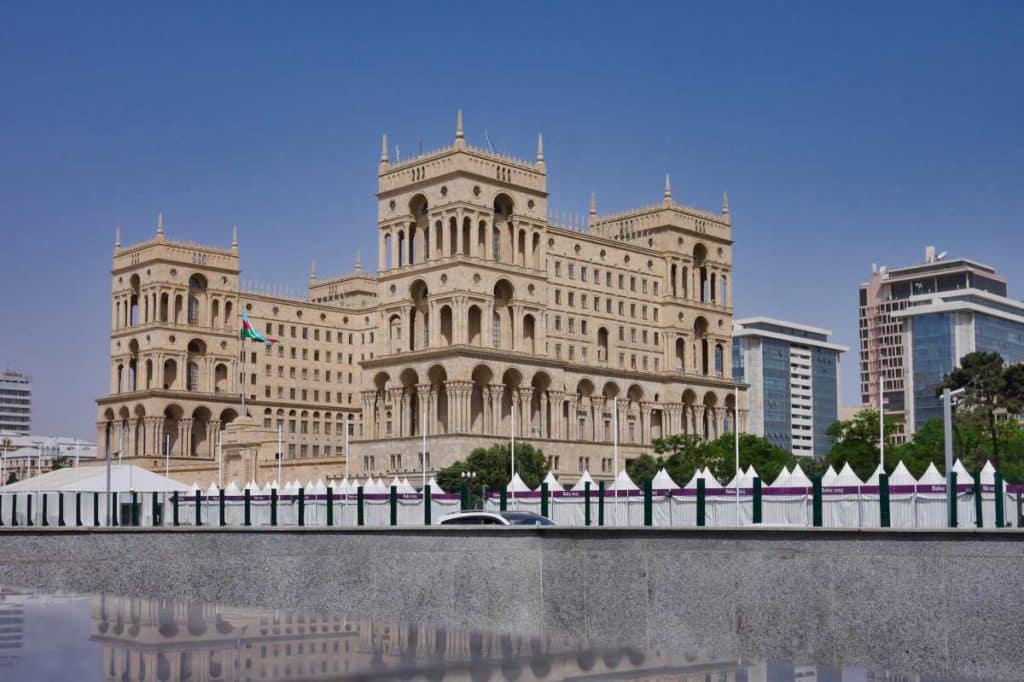
Aserbaidschan Sehenswürdigkeiten
A country as diverse as Azerbaijan offers numerous unforgettable destinations. But some of them are more for connoisseurs. We have summarized more on this page about Azerbaijan . In any case, the following places in Azerbaijan are must-sees:
- Baku – The Azerbaijani capital is a feast for architecture fans. In addition to oriental buildings such as the Şirvanşah Palace, the Maiden’s Tower and the Juma Mosque, Art Nouveau villas, neo-Gothic palaces, magnificent Soviet buildings and modern glass palaces such as the three Flame Towers will surprise you.
- Heydər Əliyev Center – Zaha Hadid designed this spectacular exhibition center in Baku, where the permanent exhibition “Mini Azerbaijan” with miniature buildings from all over the country on a scale of 1:33 is particularly worth seeing.
- The Fire Temple of Suraxanı – On the Abşeron Peninsula there is not only a Zoroastrian fire temple, but also a natural gas fire called Yanar Dağ burning since ancient times.
- Qobustan – In the Qobustan National Park there are 6000 year old rock paintings, which are not for nothing a UNESCO World Heritage Site. You should also pay a visit to the bubbling mud volcanoes in the area.
- Şəki – The 2000-year-old Silk Road town of Şəki boasts the UNESCO-protected Khan Palace and three mystical caravanserais. One of them has been converted into a hotel.
- Gəncə – The second largest city in Azerbaijan was once an important trade center. It is an excellent starting point for a trip to the former German settlements of Göygöl, Tovus, Şəmkir and Çınarlı. In Kedabag you can follow in the footsteps of the Siemens brothers.
- Lahic – The enchanted mountain village of Lahic lies at an altitude of almost 1400 meters and is surrounded by castle ruins and waterfalls – a wonderful hiking area.
- Lənkəran – Nature lovers will find national parks with hiking trails, lagoons with flamingos, untouched steppe landscapes and real primeval forest in the subtropical climate on the Caspian Sea.
- Naxçıvan – The breathtakingly beautiful, mountainous enclave is an almost unknown eco-paradise. Between Ararat and Ordubad lie the “Machu Picchu” of Eurasia, the Tomb of Noah and the oldest salt mine in the world.
- Nabran – Here, in the most popular seaside resort of the Abşeron Peninsula, a beautiful sandy beach merges with untouched forests. Eco-tourism is coming, hiking is already possible.
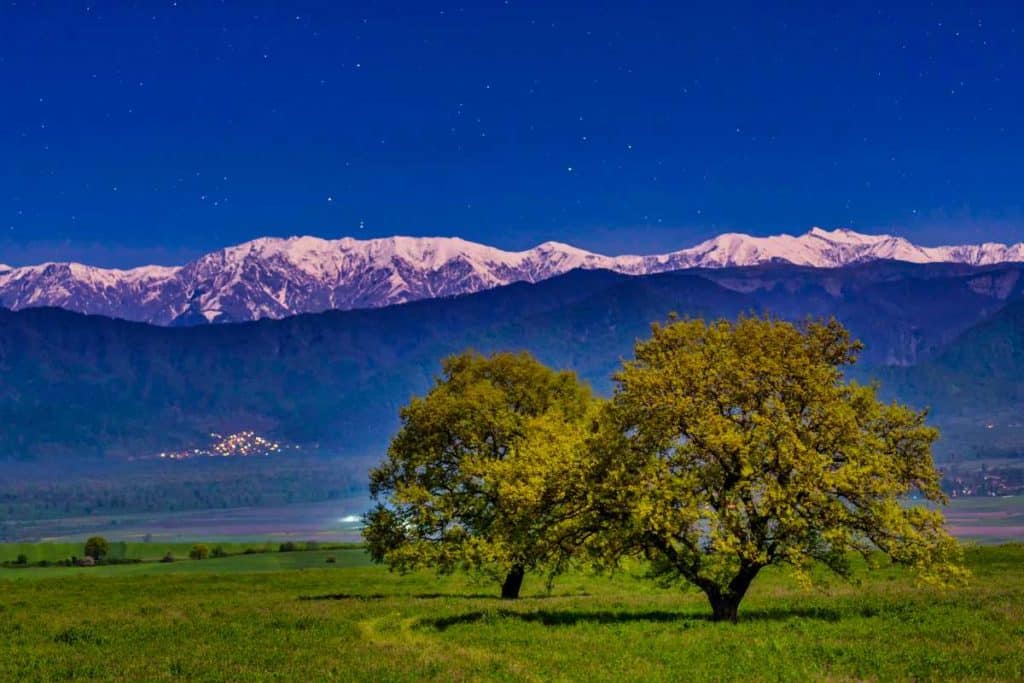
What else there is to see
The places just described represent a top 10 for a trip to Azerbaijan. However, there are many other exciting places that many tourists may not yet have on the screen:
- Şıxov Beach – The James Bond film “The World Is Not Enough” was filmed at the gates of Baku. You can even swim to the discarded oil platform.
- Zaqatala – 40 kilometers from Zaqatala the largest waterfall in Azerbaijan is located. The steep descent into the rocky gorge is a must for adventurers.
- Qəbələ – Around this small town on the Great Caucasus, 150 kilometers from the Iranian border, a world-class ski area is developing, with beautiful resorts and cable cars.
- Naftalan – Wellness lovers will find something entirely new here: lukewarm petroleum baths in the renovated Chinar Sanatorium.
- Sumqayıt – 30 kilometers outside Baku, the “donkeys”, the oil production pumps, can still be seen in action. 14 kilometers to the northwest are the red-and-white striped Candy Mountains, one of Azerbaijan’s iconic landscapes.
Entering Azerbaijan
For travelers from most Western countries a passport valid for 3 months after departure is sufficient. Some temporary passports are also accepted.
Everyone who wants to travel to Azerbaijan needs a visa (E-visa). Tourist visas are valid for 30 days and easy to get online. A copy of the passport must be scanned and paid for by credit card. After three days at the latest, you will receive the visa as a PDF (without photo) and print it out. It must be presented upon entry. An extension of the visa is possible at the Ministry of Foreign Affairs in Baku.
Registration
International visitors must register with the State Migration Service within 72 hours of arrival if they intend to stay in the country for more than 15 days. Those staying with friends or acquaintances must register themselves. Hotels usually take care of this service.
Azerbaijan Arrival – How to get to Azerbaijan
To start your Azerbaijan trip, logically, you must first come to Azerbaijan. Here we will show you what travel options are available.
The safe and comfortable Azerbaijan Airlines (AZAL), which has been operating since 1992, takes you directly to Baku. Ukraine International Airlines offers flights from several Western cities to Baku (with a stop in Kiev).
Travelling inside Azerbaijan
Driving a cab is still very cheap in Azerbaijan and the best choice for a day trip from Baku. However, if you want to make a round trip or drive inland, it makes sense to take a rental car, preferably with four-wheel drive. The road system is surprisingly good, but speed traps lurk at every corner. In any case, there are plenty of gas stations!
In recent years, airports have also been built in smaller cities in Azerbaijan. There are direct connections from Baku to Gəncə and to Naxçıvan.

By train or bus
Between Baku and Tbilisi in Georgia, there is a brand new night train that runs through the Caucasus. There are also train connections in the country itself, e.g. from Baku to Gəncə, Şəki and Lənkəran, but the trains usually run only once a day. From the central bus station in Baku, buses go in all directions, also several times a day.
There is a metro only in the capital Baku. Currently, there are two metro lines. The stations and carriages are similar to those in other cities of the former USSR. The metro is fast and cheap, but in the city center there are only two stations from which you can get to the outskirts of the city. The airport is to be connected in the near future.
Cabs operate in all cities. In Baku, there are the aubergine-colored Baklanjan cabs, which are real London cabs. You should not expect to speak foreign languages, but you can get by with Russian.
Azerbaijani food
In Azerbaijan you will surely want to try the local cuisine. This article from Christian Lang , which lists the most important dishes of Azerbaijani cuisine, will help you.
Overnight stay in Azerbaijan
The standard of Azerbaijani hotels has improved significantly in recent years. In Baku there are recommendable hotels in every category. For little money you can even stay in the old town. Reviews on sites like Expedia * are helpful.
Eating and drinking in Azerbaijan
Azerbaijani cuisine has much to offer and has also been influenced over time by the regional cuisines of Iran, Turkey and Georgia. These various influences have been combined with ancient traditions and thus evolved. In our article on Azerbaijani food , we have summarized the most delicious dishes for you. By the way, the drinking water should not be drunk in the whole country.
Azerbaijani belongs to the southwestern Turkic languages and is closely related to Turkish. It sounds relatively foreign to our ears, yet it is useful to learn at least some phrases in Azerbaijani, the people here are very happy when foreigners learn their language!
Russian is also common, so if you speak this language, you will also get ahead in many places. More and more young people speak English as well.
You want to learn more Azerbaijani? Then we recommend you this book.
- Mammadova, Raena (Author)
Azerbaijan is a very safe country. In Baku you see a lot of police in the cityscape. Even in the dark, you can feel safe. The crime rate is even lower than in many European cities of this size. As a visitor, you should always carry your passport and visa. Provocative clothing is not welcome.
Emergency numbers
Should something happen, you can call the emergency numbers. Often someone on the end of the line speaks English:
- Fire Brigade: Tel. 101
- Police: Tel. 102
- Ambulance: Tel. 103
- Lost and Found: Tel. 5909191
- Ministry of Tourism Information Center: Tel. 147
Electricity
The mains voltage is 220 V. With a European plug, you can plug any electrical appliance into one of the type C and F sockets used in Azerbaijan. As far as mains voltage and sockets are concerned, there are no differences compared to Western countries.
In Baku there are English and even German speaking doctors. The hospitals are modern, but often do not meet European standards. Outside Baku, the standard is lower.
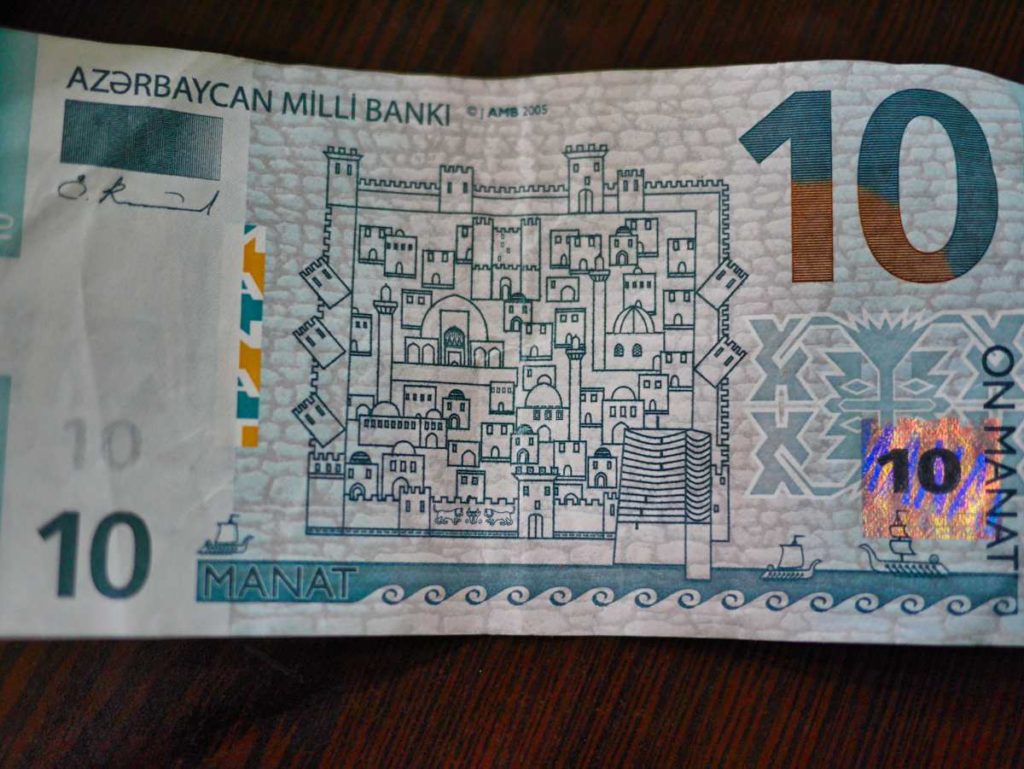
The official currency in Azerbaijan since 1992 is the Azərbaycan Manatı. The Manatı is legal tender and must be accepted everywhere.
Withdrawing money in Azerbaijan
You can find ATMs in almost all cities in Azerbaijan. It is important that when withdrawing and paying you do not select the conversion in euros or dollars, but in the local currency, otherwise it will be expensive. You can use your EC card (Maestro) and/or credit card to withdraw Manat. Credit cards are not always accepted. The most common is the Visa card.
Telephone and Internet
WiFi is available in almost every café, hotel or restaurant in larger cities. However, you will be asked to enter your cell phone number and also click on the flag of the country where the provider is located. A few seconds later you will receive a password via SMS. Normally, you search for the network “Baktelekom”, for example, and open the browser. After entering the SMS password, the WLAN is activated.
Book recommendations
Everything you need to know about Azerbaijan’s troubled past, presented in a nutshell.
- Johenning, Heike Maria (Author)
You want to know more about Azerbaijan’s culture? Than this book is the right choice!
- Heike Maria Johenning (Author)
Classical travel guide, that also covers Armenia and Georgia.
- Holger Kretzschmar (Author)
To prepare your trip, it is best to learn a few words in Azerbaijani. This book is great for beginners!
- John, Constanze (Author)
This compendium should probably contain pretty much all the dishes that exist in Azerbaijani cuisine. Wonderfully designed and over 800 pages strong!
- Said, Kurban (Author)
Portrait of Azerbaijan, presenting the country in all its facets.
What other Azerbaijan travel advice is important to you? Have you been here before? Let us know and write us a comment! And make sure to follow us on Facebook for more articles.
* – this link is an affiliate link. If you buy or order something here, we will receive a small commission. It won’t cost you a cent extra and we can continue to write new articles for you. Thank you for your support!
Heike Maria Johenning
Other interesting articles.
Has anything changed in the information? Do you have any tips or questions? We look forward to your comment!
Share this post
Für Echte Fans
Unser wöchentlicher newsletter für echte osteuropafans, for real fans, our weekly newsletter for real eastern europe fans.
Cookies on GOV.UK
We use some essential cookies to make this website work.
We’d like to set additional cookies to understand how you use GOV.UK, remember your settings and improve government services.
We also use cookies set by other sites to help us deliver content from their services.
You have accepted additional cookies. You can change your cookie settings at any time.
You have rejected additional cookies. You can change your cookie settings at any time.
Getting help
The Foreign, Commonwealth & Development Office ( FCDO ) cannot provide tailored advice for individual trips. Read this travel advice and carry out your own research before deciding whether to travel.
Emergency services in Azerbaijan
Ambulance: 103
Police: 102
Contact your travel provider and insurer
Contact your travel provider and your insurer if you are involved in a serious incident or emergency abroad. They will tell you if they can help and what you need to do.
Refunds and changes to travel
For refunds or changes to travel, contact your travel provider. You may also be able to make a claim through insurance. However, insurers usually require you to talk to your travel provider first.
Find out more about changing or cancelling travel plans , including:
- where to get advice if you are in a dispute with a provider
- how to access previous versions of travel advice to support a claim
Support from FCDO
FCDO has guidance on staying safe and what to do if you need help or support abroad, including:
- finding English-speaking lawyers , funeral directors and translators and interpreters in Azerbaijan
- dealing with a death in Azerbaijan
- being arrested or imprisoned in Azerbaijan
- getting help if you’re a victim of crime
- what to do if you’re in hospital
- if you’re affected by a crisis , such as a terrorist attack
Contacting FCDO
Follow and contact FCDO travel on Twitter , Facebook and Instagram . You can also sign up to get email notifications when this travel advice is updated.
You can also contact FCDO online .
Help abroad in an emergency
If you’re in Azerbaijan and you need emergency help from the UK government, contact the British Embassy in Baku .
FCDO in London
You can call FCDO in London if you need urgent help because something has happened to a friend or relative abroad.
Telephone: 020 7008 5000 (24 hours)
Find out about call charges
Risk information for British companies
The Overseas Business Risk service offers information and advice for British companies operating in Azerbaijan on how to manage political, economic, and business security-related risks.
Related content
Is this page useful.
- Yes this page is useful
- No this page is not useful
Help us improve GOV.UK
Don’t include personal or financial information like your National Insurance number or credit card details.
To help us improve GOV.UK, we’d like to know more about your visit today. Please fill in this survey (opens in a new tab) .
Travel advice for Azerbaijan

Switzerland and Azerbaijan
Eda.base.components.templates.base.accesskeys.
- Travel advice
Start of page Last update 27.11.2017
We’re sorry, this site is currently experiencing technical difficulties. Please try again in a few moments. Exception: request blocked

- Countries & Regions
- International Organisations (IOs)
- Climate Change
- Counter Terrorism
- Disarmament
- Cybersecurity
- International Peacekeeping
- Singapore's Voluntary National Review
- Small States
- Sustainable Development
- Pedra Branca
- Singapore Universal Periodic Review
- Water Agreements
- Find A Singapore Overseas Mission
- Foreign Representatives To Singapore
- COVID-19 Information
- Travel Tips
- Visa Information
- I Need Help Overseas
- Passport Matters
- Legalisation of Documents
- Travel Advisories and Notices
- Useful links
- Press Statements, Transcripts & Photos
- Announcements and Highlights
- Experience Singapore
- Foreign Service Officer (Functional and Corporate)
- Foreign Service Officer (Political and Economic)
- Foreign Service Administration Specialist
- Job Opportunities
- Pre-University
- Undergraduate
- Foreign Service Scholarships
- Recruitment
- Scholarship
- Reach.gov.sg
Travel Advisory: Situation in the Nagorno-Karabakh Region
18 September 2022 In view of the unpredictable security situation and ongoing tension along the border between Azerbaijan and Armenia, Singaporeans are advised not to travel to the Nagorno-Karabakh region and surrounding areas.
Singapore has no diplomatic representation in Azerbaijan and Armenia. Singaporeans there who require consular assistance should contact the 24-hour MFA Duty Office at:
Ministry of Foreign Affairs
Tel: +65 63798800/6379 8855
Fax: +65 6476 7302
Expand All | Collapse All
Ministry of Health (MOH) Public Health Advisory
Travellers should refer to the ICA website for the latest information on travelling to/from or transiting through Singapore. For the latest updates on Singapore’s COVID-19 situation, please refer to the MOH website at https://www.moh.gov.sg/covid-19 .
Entry and Exit
PCR test certificates are no longer required for entry to Azerbaijan. Citizens of Singapore are able to travel to Azerbaijan by air under the following conditions:
- Submission of an official document issued by the relevant country (COVID passport) on complete vaccination or recovery from COVID-19 for passengers over 18 years of age.
You may wish to refer to the following web page(s) for information on entry restrictions affecting travellers from Singapore to Azerbaijan:
https://azerbaijan.travel/ covid-19-en
The information here only serves as a guide. As entry restrictions may change at short notice, you are advised to contact your travel agency or the Embassy of Azerbaijan in Jakarta (see https://jakarta.mfa.gov.az/en ) to ensure that you have accurate information for your specific purpose prior to departure.
Safety and Security
Safety & Security
In view of the unpredictable security situation and ongoing tension along the border between Azerbaijan and Armenia, Singaporeans are advised not to travel to the Nagorno-Karabakh region and surrounding areas.
Drug offences come with heavy penalties, including long prison sentences and heavy fines.
Carry a valid travel document(s) with you at all times.
Respect local sensitivities, especially when visiting religious sites.
Additional Information
General travel advice.
Overseas Travel – Be Informed & Be Safe [Updated on 5 February 2024]
Singaporeans planning overseas travel are reminded to take the necessary precautions, including being prepared to deal with accidents, natural disasters or terrorist attacks. Singaporeans are also reminded to be familiar with your destination’s local laws, customs, and COVID-19 regulations.
Demonstrations do occur in major cities across the world. Such demonstrations can sometimes escalate into violence. It is important for Singaporeans to keep abreast of local news, avoid any protests or demonstrations and heed the advice of the local authorities.
When participating in outdoor leisure activities overseas, Singaporeans should be mindful that certain sporting activities, especially in open seas, may carry risks. Besides ensuring that one has the physical competencies and appropriate condition to undertake the activity, every effort should be made to ascertain if the trip organiser or guide is reliable and competent, and that appropriate safety and contingency plans are in place. When in doubt, Singaporeans should consult the relevant professional bodies or sporting associations for specific advice.
For those planning to travel, here are some tips:
Before travelling
- Familiarise yourself with our network of overseas missions.
- Purchase comprehensive travel insurance and be familiar with the terms and coverage.
- Equip yourself with research about your destination’s entry requirements, current situation, local laws and customs.
- eRegister with us on our website ( www.mfa.gov.sg ) so that we may reach out to you during an emergency.
While travelling
- Always take care of your personal safety, remain vigilant and monitor local weather news, advisories, and security developments.
- Exercise caution around large gatherings and avoid locations known for demonstrations or disturbances.
- Be prepared for possible delays and last-minute changes in travel plans especially during unforeseen events such as natural disasters, social unrest or terror attacks.
- Stay connected with your friends and family. Inform them of your whereabouts and provide them with your overseas contact details.
- In the event that you require consular assistance, please contact the nearest Singapore Overseas Mission or call the Ministry of Foreign Affairs Duty Office at +65 6379 8800/+65 6379 8855.
Advisory: Email Scams
There have been reports of individuals receiving scam emails/messages purportedly sent from friends in distress overseas. These emails/messages typically originate from an email address/social media known to the receiver bearing claims of the sender getting into trouble overseas and urgently requesting financial assistance. The sender would also claim to have approached a Singapore Embassy/Consulate and the local Police for help to no avail.
MFA takes the safety of all Singaporeans very seriously. Singaporeans in distress approaching our Overseas Missions for assistance will be rendered with all necessary consular assistance. If you receive such emails/messages from purported friends seeking funds transfers, we strongly advise you to call them first to verify the authenticity of the emails/messages before responding to their request. It is also not advisable to give out any personal information such as NRIC/passport numbers, address, telephone number, etc. Any form of reply, even one of non-interest, could result in more unsolicited emails. Members of the public who suspect that they have fallen prey to such scams should report the matter to the Police immediately. Should Singaporeans abroad require consular assistance, they can contact the nearest Singapore Overseas Mission or call the Ministry of Foreign Affairs 24-hr Duty Office at +65 6379 8800/+65 6379 8855.
The Ministry of Foreign Affairs is a ministry of the Government of Singapore responsible for conducting and managing diplomatic relations between Singapore and other countries and regions.
Travel Page
11 best destinations in Azerbaijan (the Land of Fire)
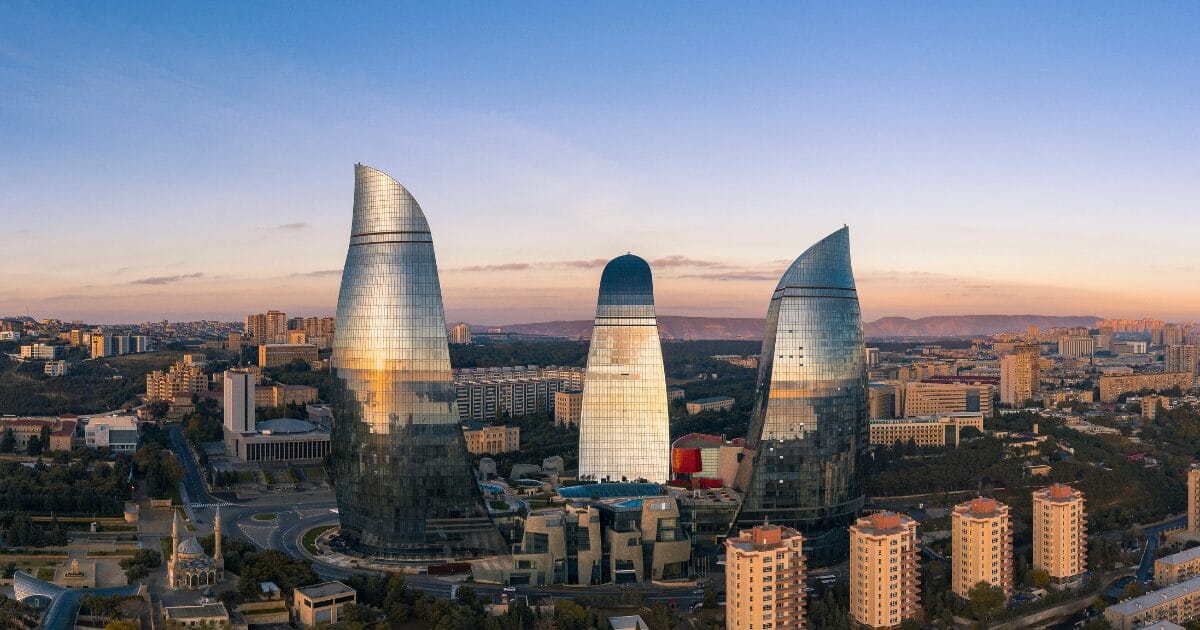
- Post author: Kevin Gagnon
- Post published: August 21, 2024
- Post category: Travel inspiration / Trip itineraries & destination discoveries
- Post comments: 0 Comments
Azerbaijan is a unique country that you shouldn’t miss out on. Located along the Caspian Sea in the Caucasus region, it has a nice mix of Caucasian, Persian, and Turkic influences. The country has amazing natural and cultural attractions: mountains, mud volcanoes, a cool big city, cute little towns, and many historic sites.
I loved my short week in Azerbaijan and can’t wait to return to explore the rest of the country, nicknamed the “Land of Fire.” Azeris are a Turkic people, and Türkiye is one of my favorite places in the world, so I know I’ll love all the destinations.
Azerbaijan is also quite inexpensive, being one of the 34 best affordable countries to travel to for $40 total per day . To continue our accommodation prices feature , we’ll share a separate post with many examples of lodging prices for these Azerbaijani destinations soon .
Here are the 11 best destinations in Azerbaijan.
Map of the 11 best destinations in Azerbaijan
Azerbaijan is a small country, slightly bigger than New Brunswick. Its population is 10 million, slightly more than Québec.
Here’s a map to locate all the destinations in this post.
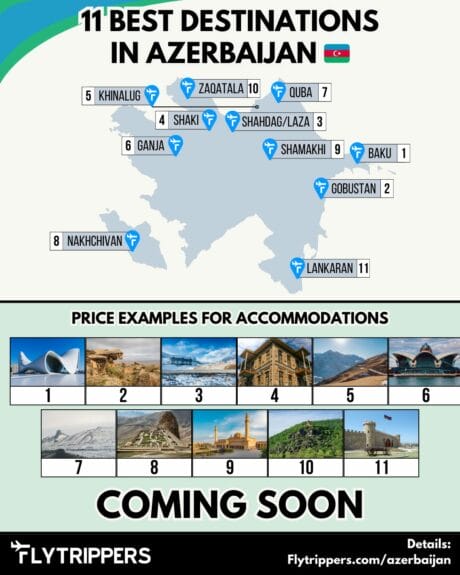
Baku ( Bakı in Azeri) is the capital of Azerbaijan, the country’s only large city, and also the largest in the entire Caucasus region! With 2.7 million inhabitants in its metropolitan area (the same as Vancouver) and so much history in one place, it has a lot for you to discover.
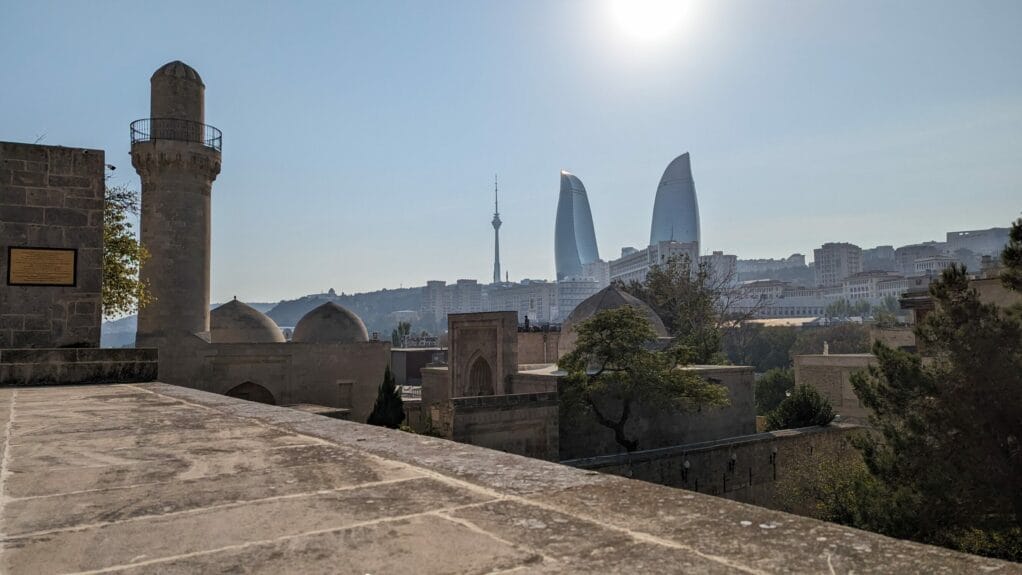
Spend at least a few days exploring the city’s many attractions. The highlight is the wonderful old walled city of Baku (a UNESCO World Heritage site ), including the Maiden Tower and the Palace of the Shirvanshahs. If you like architecture, admire the unique Heydar Aliyev Centre and the magnificent Flame Towers.
An oil and gas-rich country, Azerbaijan really loves fire! The Fire Temple of Baku is worth a visit, but you should also take a short trip about 25 kilometers (16 miles) northeast to see Yanar Dağ. Known as the “Fire Mountain,” this natural wonder is a constantly burning hillside! It was pretty cool to see and a nice place to warm ourselves on that cold November day!
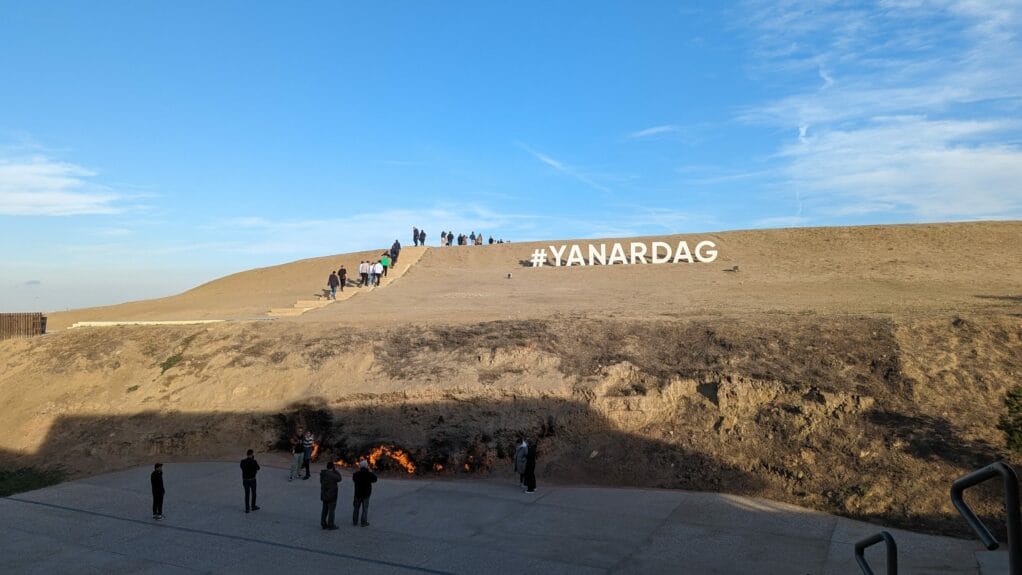
Enjoy Baku’s lively nightlife and waterfront promenade. Visit the National Carpet Museum to learn about this important part of the local culture or the world’s only museum dedicated to miniature editions of books if you like reading. You can also visit Absheron National Park at the very end of the peninsula, which I found pretty.
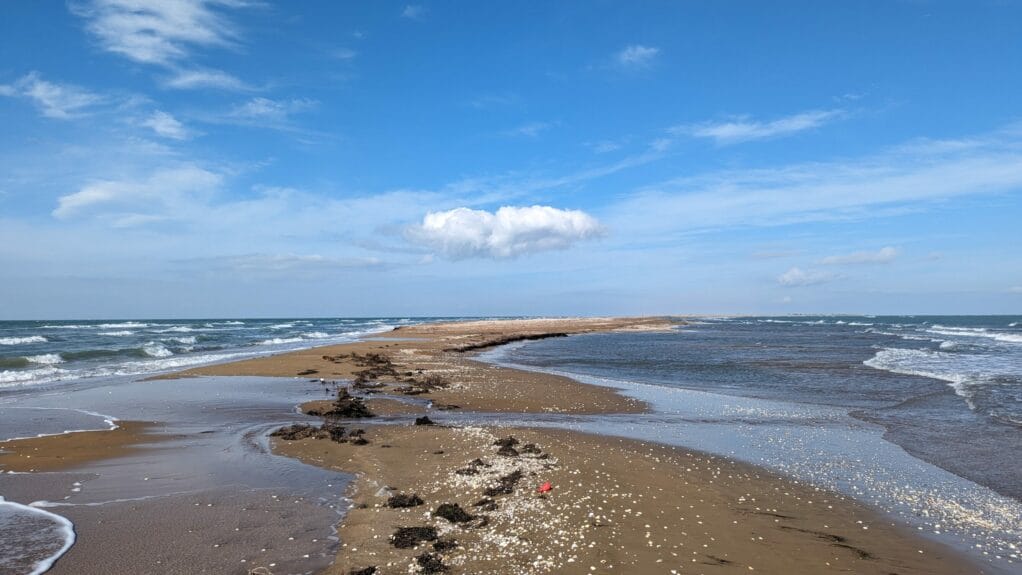
2. Gobustan
Gobustan ( Qobustan in Azeri) is a place not to miss just south of Baku — be careful; there are many places with the same name. There, you can see the unique mud volcanoes — Azerbaijan has almost as many of those erupting landforms as all other countries in the world combined!
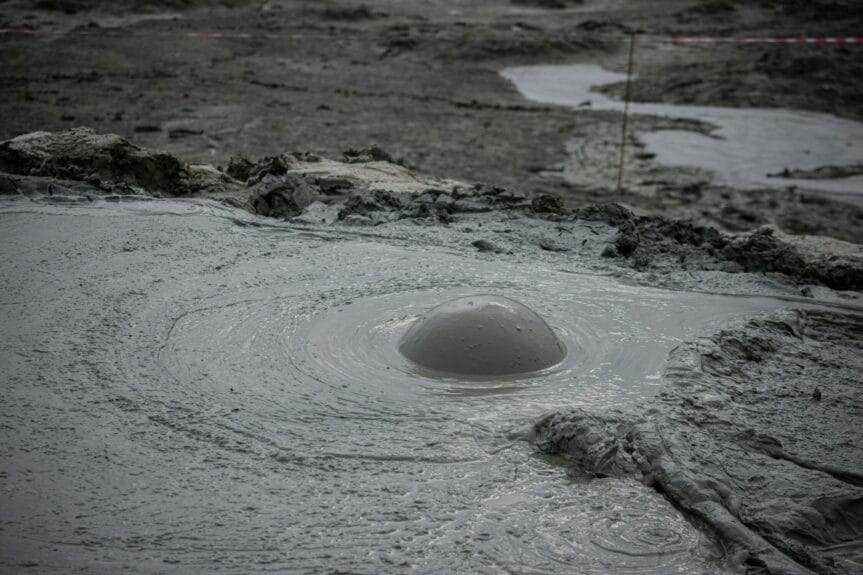
This area also has the Gobustan Rock Art Cultural Landscape, a UNESCO site with petroglyphs dating 40,000 years.
If you want something more unusual, there’s a musical stone in Gobustan National Park that has been used as an instrument since prehistoric times, and also the very strange Sofi Hamid cemetery nearby, where graves are not just graves but pieces of art!

3. Shahdag/Laza
Shahdag (sometimes Shahdagh, Şahdağ in Azeri) is a popular mountain resort and national park in Azerbaijan, while Laza is a picturesque village with beautiful waterfalls and stunning scenery. They’re pretty close, only about 15 kilometers (9 miles) apart. It’s just a 30-minute drive, so you can easily visit both in one trip.
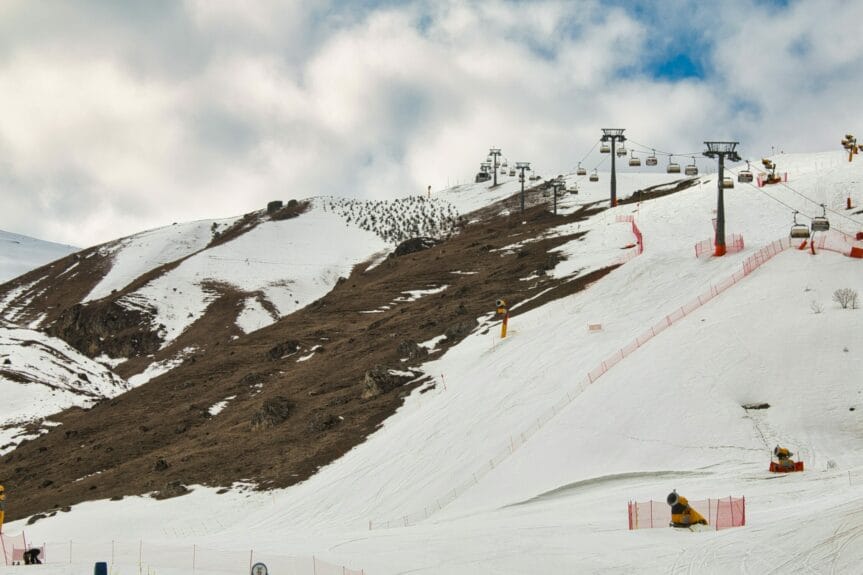
These destinations are perfect if you love the outdoors, skiing, snowboarding, hiking, zip-lining, and paragliding. Waterfall trekking in Laza is simply amazing. If you’d rather relax, you can enjoy Shahdag’s luxury resorts and spas with a range of wellness treatments.
Shahdag also has one of the world’s best Marriott points redemptions if you would like to get luxury for a small amount of points. The 5-star mountain resort, Park Chalet, Shahdag, Autograph Collection , looks stunning and costs fewer points than a basic suburban Courtyard hotel in North America. Don’t miss the Azerbaijan accommodations post for more details soon .
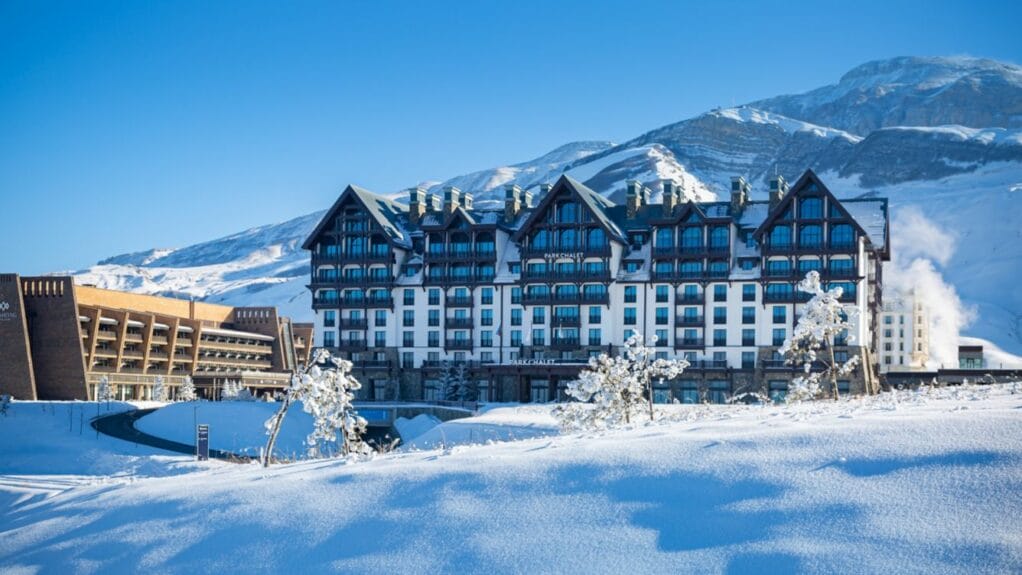
Since you’ll surely arrive from Baku, make sure to check out the Candy Cane Mountains on the drive north if you are driving or using a private taxi.
View this post on Instagram A post shared by Ulkar Nasirli (@tour.guide.azerbaijan)
Shaki (sometimes Sheki, Şəki in Azeri) is one of the oldest cities in Azerbaijan, with a history that dates back more than 2,500 years! It’s renowned for its well-preserved caravanserais. These buildings served as roadside inns for travelers when the city was an important stop on the Silk Road.
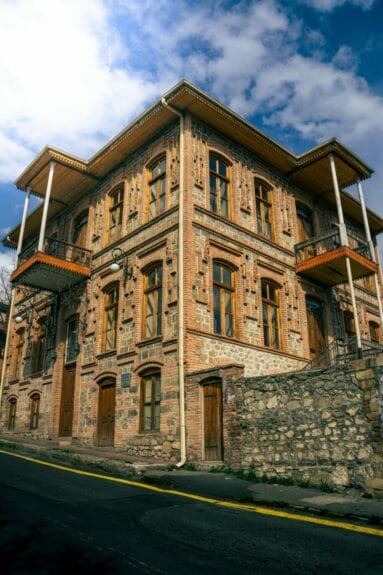
The historic city center and its Shaki Khan’s Palace ( Xan Sarayı ) is a gorgeous UNESCO site you don’t want to miss during your stay.
You can also tour the Shaki Museum of History, explore the Old Town, and taste the town’s famous sweet treat, Sheki halva , a kind of baklava. Take a short trip to the nearby village of Kish to see the historic church from Caucasian Albania (an ancient state unrelated to modern-day Albania in the Balkans).
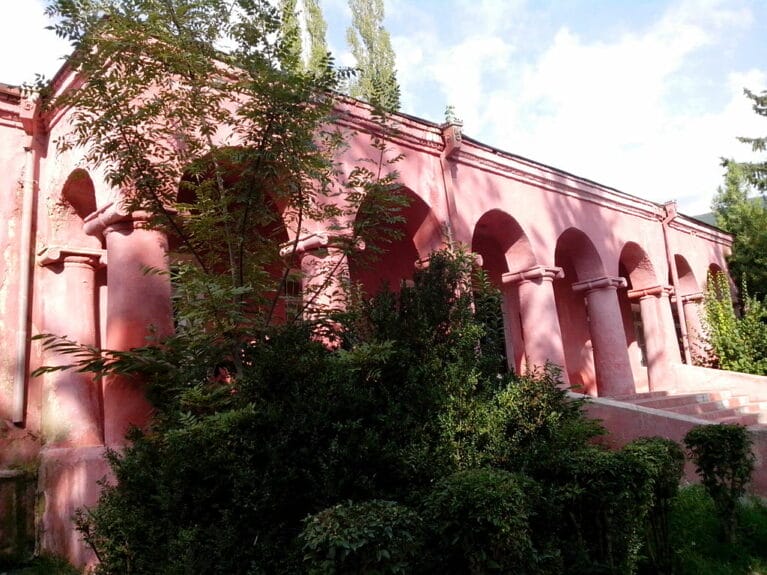
5. Khinalug
Khinalug ( Xinaliq in Azeri) is another charming village located in the Greater Caucasus Mountains, at around 2,350 meters (7,710 feet) above sea level. It’s one of the oldest and highest inhabited spots in the Caucasus.
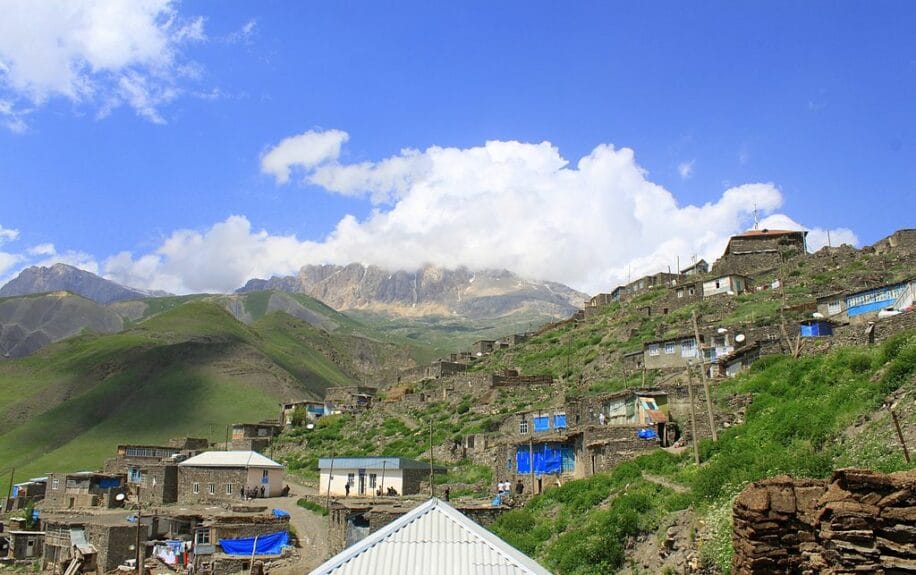
It’s also part of a UNESCO World Heritage Site that highlights the local semi-nomadic Khinalig people’s unique seasonal migration, from the mountaintop in summer to the valley in winter.
Travelers go there to admire stunning mountain views, wander in the village of traditional stone houses, and trek along scenic trails.
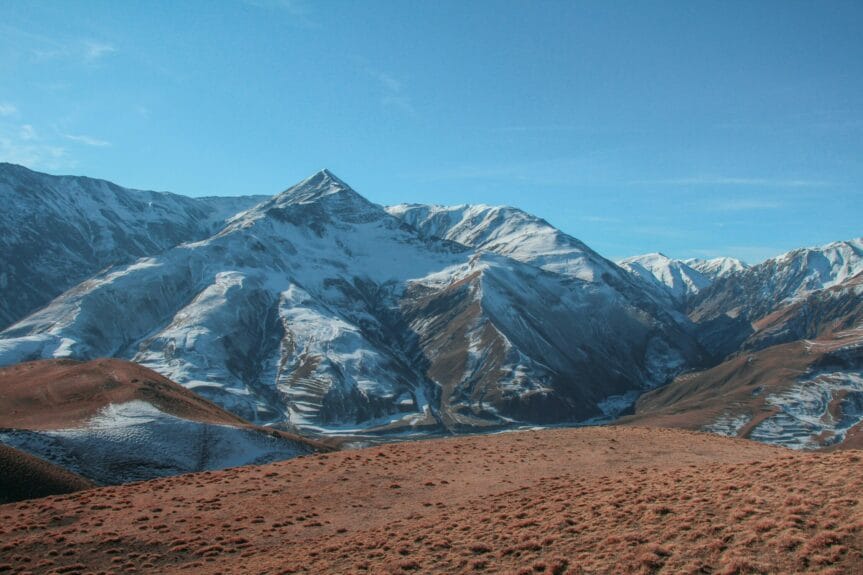
Ganja ( Gəncə in Azeri) is located in western Azerbaijan. It’s the country’s 2 nd -largest metropolitan area, with a population of around 335,600 (similar to Saskatoon). Ganja is primarily recognized for its Azerbaijani and Islamic architecture and its cultural significance.
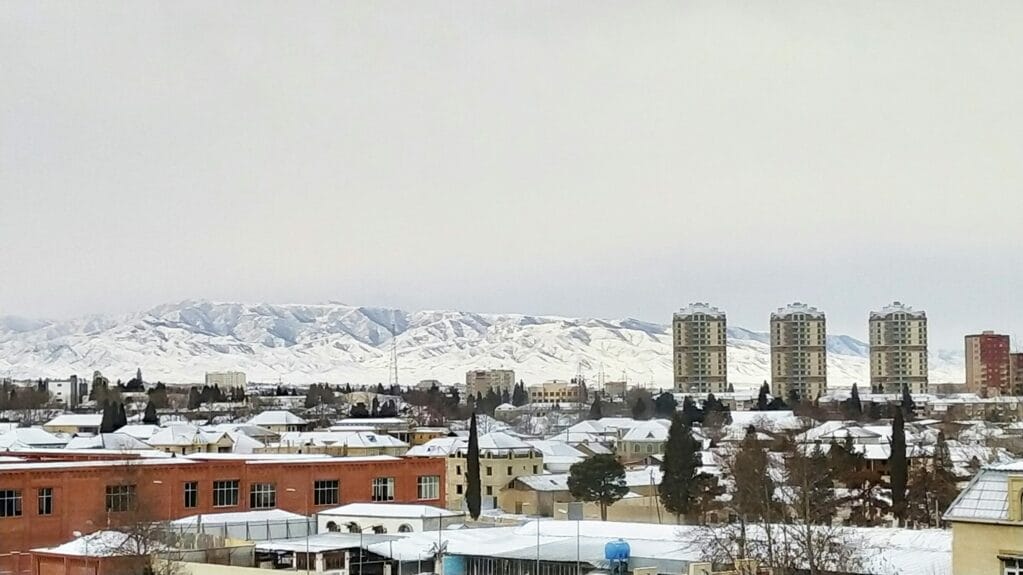
Start your visit on Javad Khan Street or at the Ganja State History Ethnography Museum to learn more about this beautiful city. Go see the Gates of Ganja, the Ganja Fortress ruins, or for something uncommon, the Bottle House of Ganja (built with 48,000 bottles). You can also explore the Nizami Mausoleum, which pays homage to the famous Persian poet Nizami Ganjavi.
Don’t miss the stunning Göygöl Lake in the Dashkasan-Göygöl National Park. Another worthwhile day trip is to Naftalan, where you can find petroleum spas: yes, you really bathe in crude oil. It apparently has therapeutic effects.
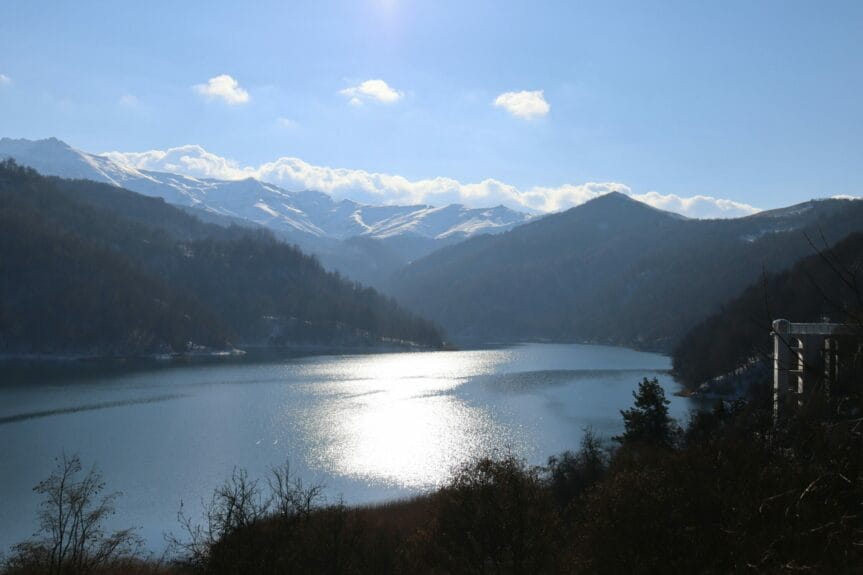
The mountain pass near Ganja was amazing! Just after the mountain, we found a natural hot spring on the side of the road too.
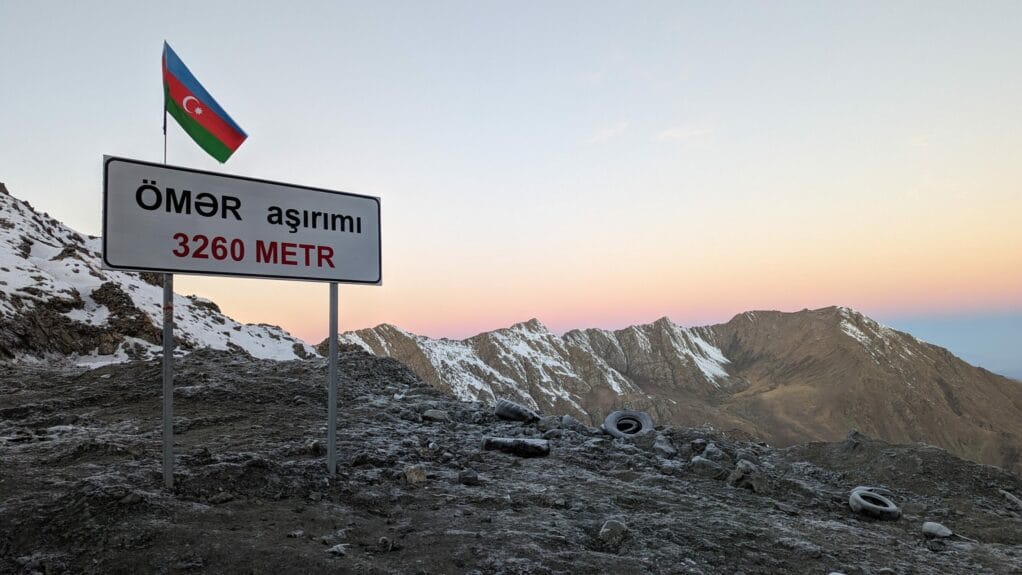
You’ll find the city of Quba in northeastern Azerbaijan. It’s located near the Greater Caucasus Mountains, approximately 170 kilometers (105 miles) north of Baku. There are several mountain treks and hikes in this region, and you can easily reach it from the capital.
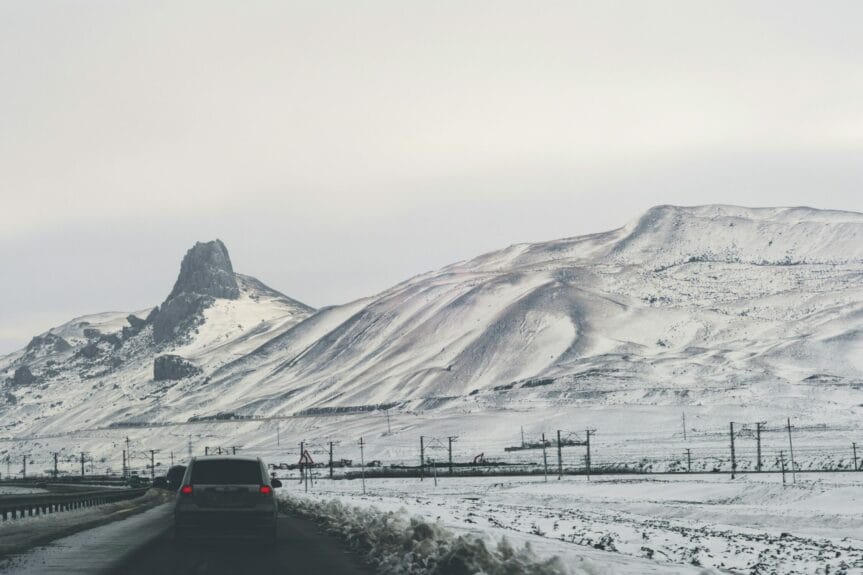
In Quba, nature lovers can discover the serenity of the Qechresh Forest, the stunning Afurdja Waterfall, and the breathtaking Tengialti Canyon. There are also some historical sites like the unique Quba Mosque (Juma Mosque), the beautiful Sakina Khanum Mosque, and the Quba Carpet Museum.
You can visit Krasnaya Sloboda ( Qırmızı Qəsəbə in Azeri), believed to be the world’s only community exclusively populated by Jewish people outside Israel and the United States. A bit further away, you can enjoy the coastline on the Caspian Sea, but Azerbaijan is not known for its beaches. Qechresh Village is another nice small town nearby.
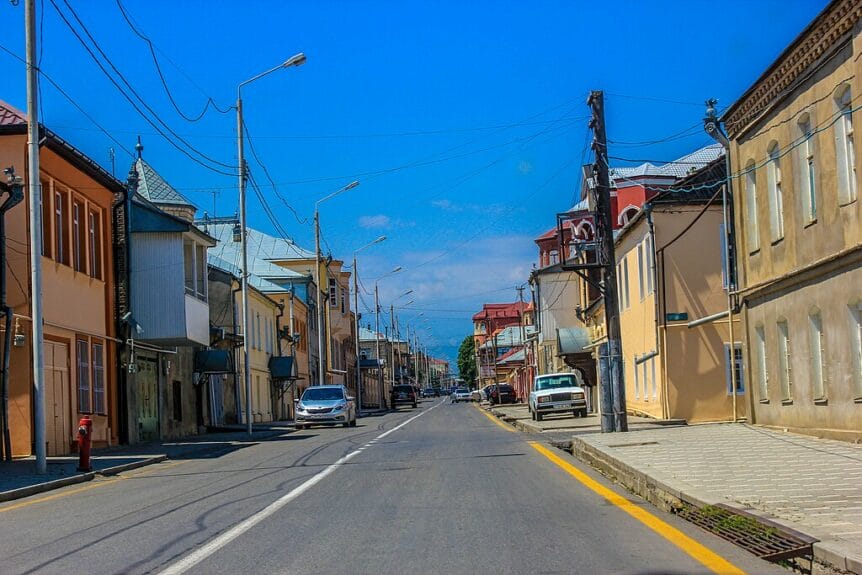
8. Nakhchivan
Nakhchivan ( Naxçıvan in Azeri) is an exclave of Azerbaijan, which means it’s geographically separated from the mainland — it’s the world’s largest subnational exclave. It’s located southwest of the country’s main territory and only shares borders with Armenia, Türkiye, and Iran.
It’s an autonomous republic with its own governance and somewhat distinct culture — it also has the benefit of being one of the least-visited parts of the country and is known for its cleanliness.
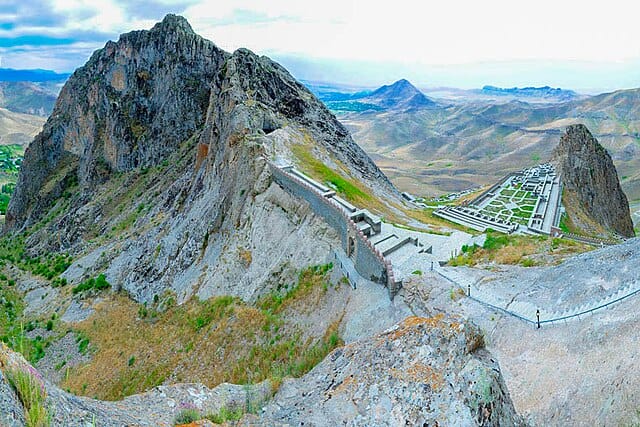
You can explore ancient sites like Alinja Castle, an impressive mountaintop fortress called the “Machu Picchu of Eurasia,” the Momine Khatun Mausoleum, and the Tomb of Noah.
Mount İlandağ, the beautiful Aras River, and its surroundings are also worth your time. You can also relax in the healing Duzdag Salt Caves, which have salt deposits that are believed to be good for breathing and skin problems.
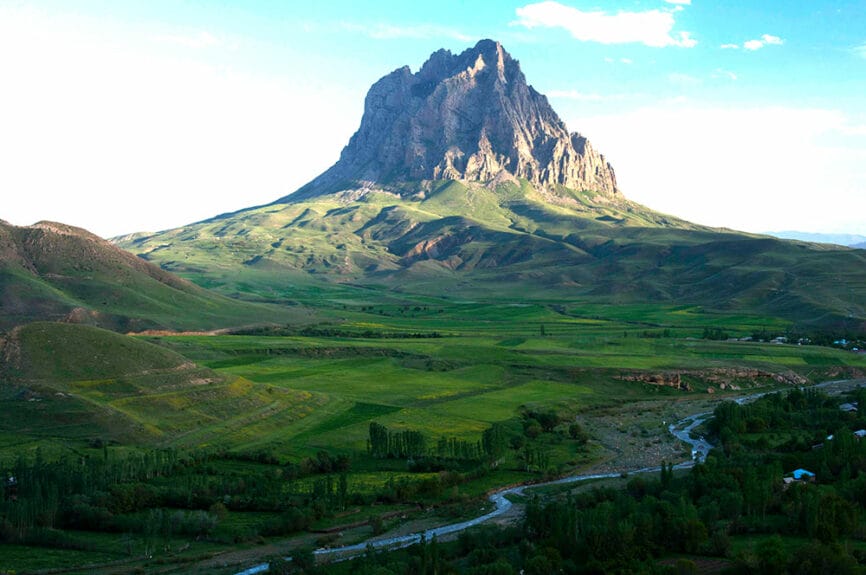
Nakhchivan was the very first part of the USSR to declare independence in 1990. It has 450,000 inhabitants (about the same as Newfoundland and Labrador) in a territory about the size of Prince Edward Island.
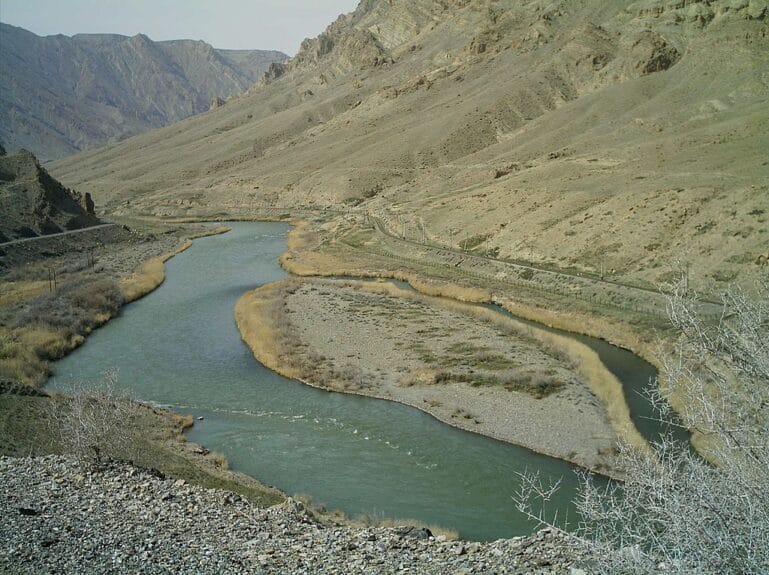
9. Shamakhi
Shamakhi ( Şamaxı in Azeri) is located in central Azerbaijan. It has a rich history and is surrounded by picturesque landscapes. The city is known for its ancient landmarks, including the Yeddi Gumbez Mausoleum and the historical Juma Mosque, which dates back to the 8 th century.
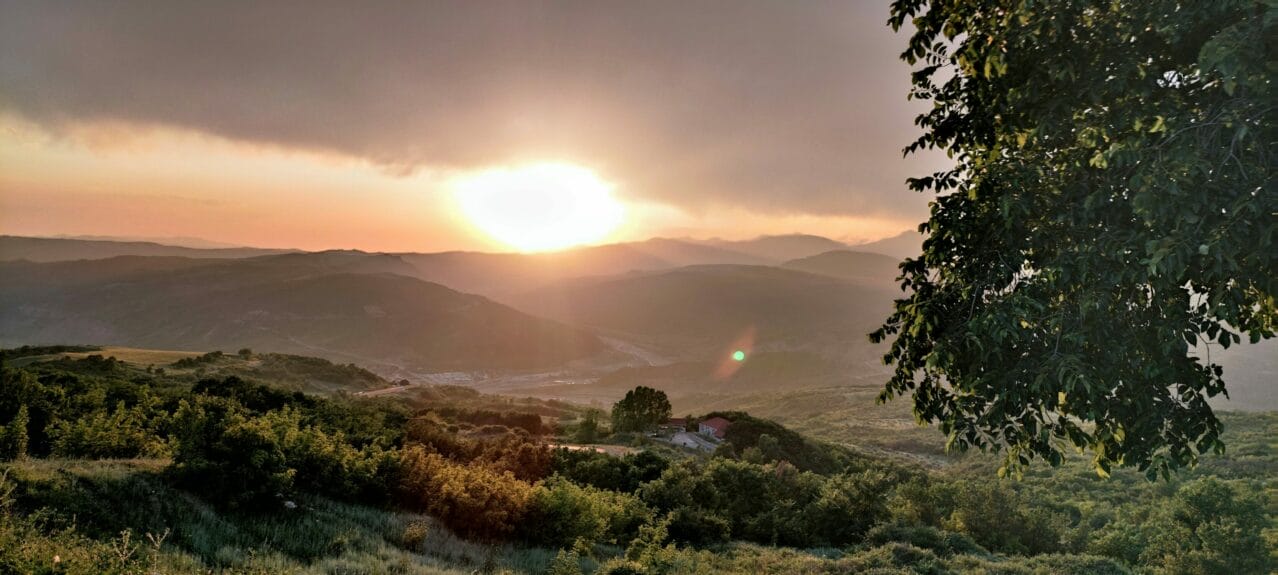
It was the home of the famous traditional dancers, the Shamakhi dancers. The Shamakhi Astrophysical Observatory is another great attraction.
About 40 kilometers (25 miles) northwest of Shamakhi, you’ll find the village of Lahıc, celebrated for its local crafts, especially copperware and carpets. For a taste of local produce, including fresh fruits and wines, you can visit the Ivanovka farms.
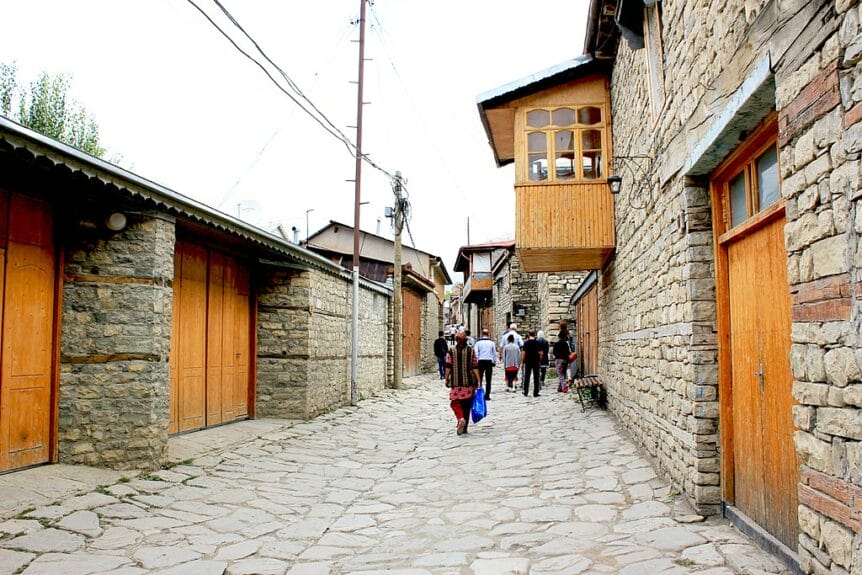
10. Zaqatala
Zaqatala is located in northwestern Azerbaijan near the border with Georgia. This region is renowned for its breathtaking natural scenery.
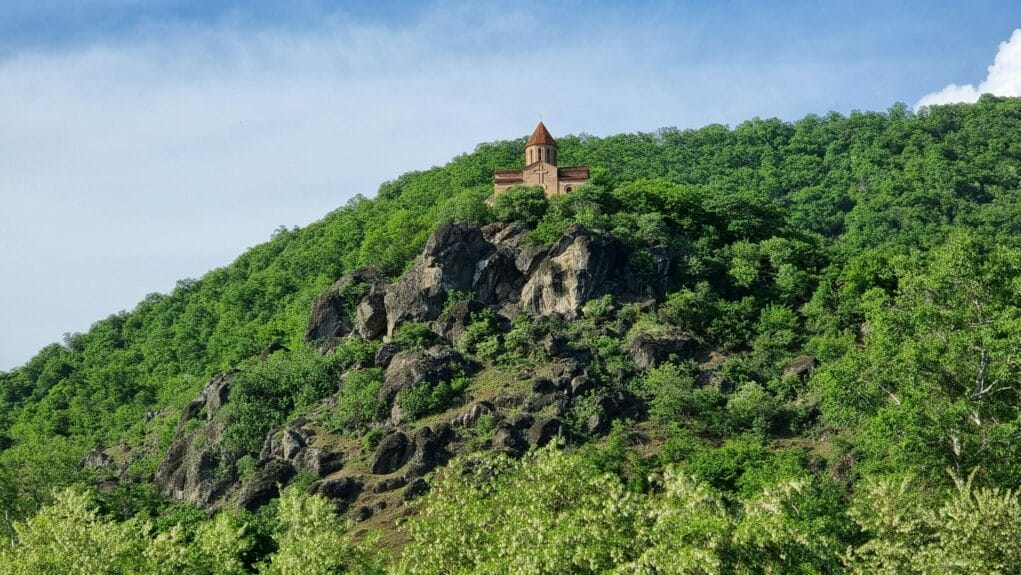
The Zagatala Nature Reserve is a hotspot for wildlife such as brown bears, boars, and west Caucasian tur. Don’t miss the stunning Mestdergah Waterfall, the best in the area by far. Whether you’re into hiking, camping, or just relaxing in nature, this place has it all.
The main attractions in the city itself include the ancient Zaqatala Fortress and the ruins of Caucasian Albania churches. Be sure to taste Zagatala’s famous hazelnuts and walnuts — they’re delicious!
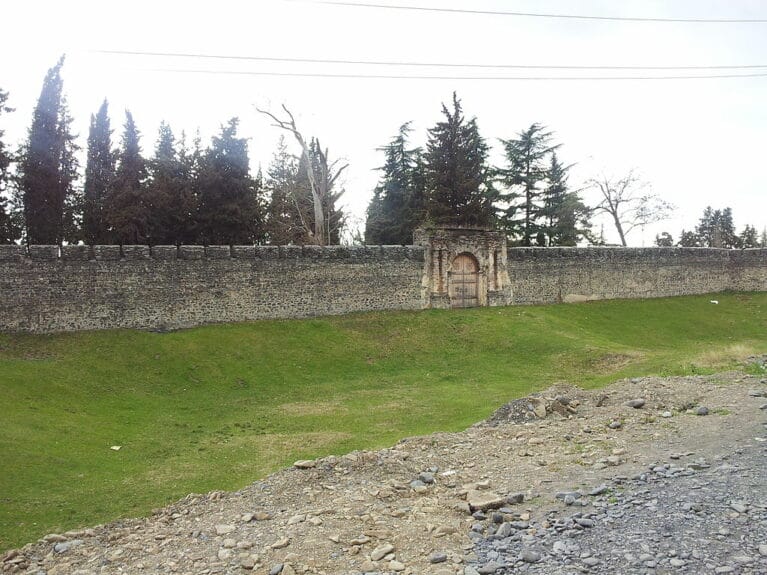
11. Lankaran
Lankaran ( Lənkəran in Azeri) is located in Southeastern Azerbaijan, where inhabitants are mostly ethnic Talysh people. The region is the gateway to neighboring Iran, a country with more Azerbaijanis than Azerbaijan!
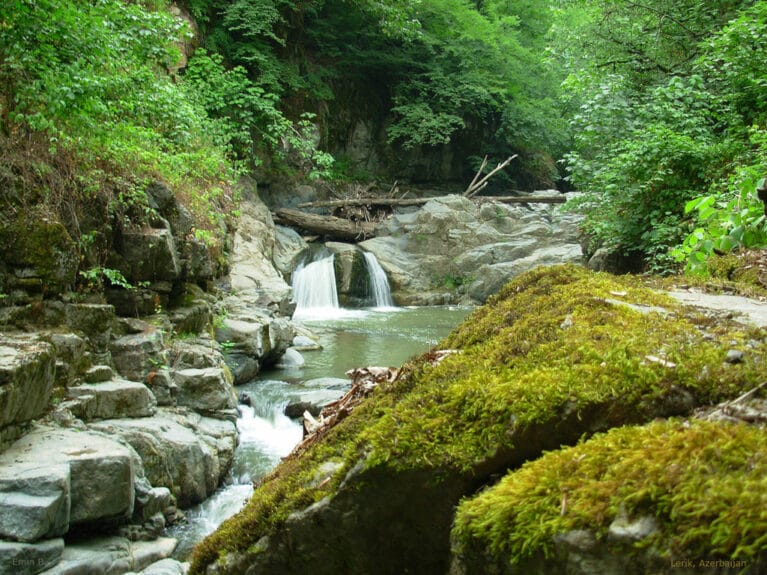
This area has wonderful natural attractions like the UNESCO-listed Hyrcanian forests. You can visit Hirkan National Park and Ghzil-Aghaj State Reserve to admire the fauna and flora. The area also has some sandy beaches and mineral springs.
In Astara, you can also admire the Yanar Bulağ Fire Spring; it’s not often you can see water on fire.
View this post on Instagram A post shared by He is Nijat (@nijatgasim)
Learning how to travel for less
Join over 100,000 savvy Canadian travelers who already receive Flytrippers’ free newsletter so we can help you travel for less (and inspire you, too)!
Sign up for our free newsletter
Summary .
Azerbaijan is a captivating destination at the crossroads of Eastern Europe and Western Asia, offering a unique blend of natural beauty and rich cultural heritage. From the stunning landscapes of the Caucasus Mountains to the serene waters of the Caspian Sea, Azerbaijan is an affordable and diverse travel spot. You can explore ancient historical sites or marvel at the futuristic architecture in Baku. With its vibrant traditions, delicious cuisine, and a range of outdoor adventures, Azerbaijan promises a memorable and enriching travel experience.
What would you like to know about the best places to visit in Azerbaijan? Tell us in the comments below.
See the flight deals we spot: Cheap flights
Discover free travel with rewards: Travel rewards
Explore awesome destinations : Travel inspiration
Learn pro tricks : Travel tips
Featured image: Baku, Azerbaijan (photo credit: Lloyd Alozie)
Share this post to help us help more people travel more for less:
Kevin Gagnon
You might also like.

Cambodia: examples of nice and affordable accommodation in 6 destinations
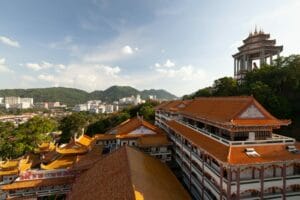
Malaysia: 3 examples of nice and affordable accommodation in 11 destinations
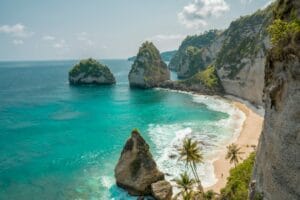
A beautiful and popular island adds an entry tax for tourists to preserve its little paradise
Leave a reply cancel reply.

IMAGES
COMMENTS
The U.S. government advises to exercise increased caution in Azerbaijan due to terrorism and armed conflict risks. Do not travel to the border with Armenia or the Nagorno-Karabakh region, where military activity could occur.
Border with Armenia - Avoid all travel. Avoid all travel to within 5 km of the border with Armenia due to the volatile security environment and the risk of armed conflict.. This advisory excludes the area within 1 km of the border between Armenia and the Azerbaijani Autonomous Republic of Nakhchivan where you should avoid non-essential travel due to the risk of armed clashes.
Nagorno-Karabakh and surrounding areas. The Foreign, Commonwealth & Development Office ( FCDO) advises against all travel to: Nagorno-Karabakh. the districts ('rayons') of Zengilan, Jabrayil ...
Emergency Information for American Citizens. Azerbaijan Level 3 Travel Advisory (August 31, 2022) By U.S. Embassy Baku. 5 MINUTE READ. August 31, 2022. Last Update: Reissued with updates to health information. Reconsider travel to Azerbaijan due to COVID-19-related restrictions and terrorism concerns. Some areas have increased risk.
Get the latest updates on travel risks, health, local laws and visa requirements for Azerbaijan. The Australian Government advises exercising a high degree of caution overall and avoiding some areas due to terrorism, landmines and protests.
Call us in Washington, D.C. at 1-888-407-4747 (toll-free in the United States and Canada) or 1-202-501-4444 (from all other countries) from 8:00 a.m. to 8:00 p.m., Eastern Standard Time, Monday through Friday (except U.S. federal holidays). See the State Department's travel website for the Worldwide Caution and Travel Advisories.
Learn about the travel restrictions and advisory for Azerbaijan due to COVID-19 pandemic. Find out how to enter and exit the country, what precautions to take, and what to do if you suspect infection.
Monitor travel advisories and alerts and read travel tips from the US Department of State. Enroll in the Smart Traveler Enrollment Program (STEP). ... Use the Healthy Travel Packing List for Azerbaijan for a list of health-related items to consider packing for your trip. Talk to your doctor about which items are most important for you.
General Travel Advice. Irish citizens require a visa to enter Azerbaijan. Citizens can apply online using the e-visa website. Visas are valid for 90 days, and stays must not exceed 30 days in total. A valid passport is required for travel to Azerbaijan. Irish passports should have a minimum validity of 3 months from the expiry date of your ...
Azerbaijan Level 3 Travel Advisory (August 10, 2020) Reconsider travel to Azerbaijan due to COVID-19 and terrorism concerns. Read the Department of State's COVID-19 page before you plan any international travel. The Centers for Disease Control and Prevention (CDC) has issued a Level 3 Travel Health Notice for Azerbaijan due to COVID-19.
The UK government advises against all travel to parts of Azerbaijan due to the high threat of terrorist attack and the political situation. Be aware of crime, laws, cultural differences and transport risks when travelling in Azerbaijan.
Get the latest travel advice for Azerbaijan from various sources, including Covid-19 situation, border conflicts, and terrorism risks. See the daily risk level, number of sources, and rating changes for Azerbaijan.
FCDO travel advice for Azerbaijan. Includes safety and security, insurance, entry requirements and legal differences.
Explore Azerbaijan's location, history, and human rights situation on the interactive map of the U.S. Department of State.
Key Information for Travelers to Azerbaijan. Avoid travel to Azerbaijan. If you must travel to Azerbaijan, make sure you are fully vaccinated before travel. Because of the current situation in Azerbaijan, even fully vaccinated travelers may be at risk for getting and spreading COVID-19 variants. See recommendations for fully vaccinated travelers.
Crime - Petty criminal activities such as pick pocketing in a crowded environment to sexual assault and robberies do occur in bigger cities of Azerbaijan. Make sure that all your personal valuables, including passports and other travel documents, are secure at all times. Terrorism - Always be aware of your surroundings when in public places.
To enter Azerbaijan as a visitor, your passport must usually have an 'expiry date' at least 6 months after the date you arrive and at least 2 blank pages for entry stamps. See 'visa ...
The ideal time to visit Azerbaijan is April to June, before the summer heat sets in with an average of 26-33 degrees and the summer vacations begin. Since Azerbaijanis travel a lot in their own country, it gets crowded everywhere. During the summer months, the water temperature of the Caspian Sea is 21 degrees or more.
The family forms the basic social structure in Azerbaijan. Men greet each other with a handshake, a kiss on the cheek and "salaam" (literally 'peace' but meaning 'hello'). Males should wait and see if a woman extends her hand (although most will the more religious may not) - if they do shake it lightly.
Read this travel advice and carry out your own research before deciding whether to travel. Emergency services in Azerbaijan. Ambulance: 103. Fire: 101. Police: 102. Contact your travel provider ...
Matters relating to consular services. Tel. +41 800 24-7-365 or. Tel. +41 58 465 33 33. 365 days a year - around the clock.
Click here for our Travel to the U.S. FAQs. Assistance: U.S. Embassy Baku, Azerbaijan +994-12-488-3300. [email protected]. State Department - Consular Affairs 888-407-4747 or 202-501-4444 Azerbaijan Country Specific Information Enroll in Smart Traveler Enrollment Program (STEP) to receive Alerts.
Travel Advisory: Situation in the Nagorno-Karabakh Region. 18 September 2022 ... Citizens of Singapore are able to travel to Azerbaijan by air under the following conditions: Submission of an official document issued by the relevant country (COVID passport) on complete vaccination or recovery from COVID-19 for passengers over 18 years of age. ...
Krasnaya Sloboda, Azerbaijan (photo credit: Wikimedia Commons) 8. Nakhchivan. Nakhchivan (Naxçıvan in Azeri) is an exclave of Azerbaijan, which means it's geographically separated from the mainland — it's the world's largest subnational exclave. It's located southwest of the country's main territory and only shares borders with ...